This is the September archive of Essential Politics, our daily feed on California government and politics news.
- Find our current news feed here
Be sure to follow us on Twitter for more, or subscribe to our free daily newsletter and the California Politics Podcast
- Share via
California offenders are no longer eligible for early release in the deaths of police officers
California offenders will no longer be eligible for early release if they have been convicted of murder in the death of a police officer.
Gov. Jerry Brown on Friday signed legislation that exempts offenders from consideration for compassionate or medical release.
Currently under the law, the secretary of the Department of Corrections and Rehabilitation and the Board of Parole Hearings determine whether a prisoner meets those provisions.
Offenders are typically recommended for early release if they have six months or less to live and would not pose a threat to public safety under court conditions or if a prisoner is permanently medically incapacitated.
Sen. Cathleen Galgiani (D-Stockton) has said she filed the legislation, SB 6, to target a group of offenders sentenced during a period in the 1970s, when California had neither a death penalty sentence nor a sentence of life without the possibility of parole. During that time, she said, people convicted in the deaths of police officers were sentenced to life with parole.
Opponents of the bill said the parole board was capable of screening the petitions to determine who is appropriate for release. They said medical parole was meant to decrease the financial strain of caring for medically incapacitated inmates.
- Share via
Bill increasing penalties for possessing date-rape drugs becomes law without governor’s signature
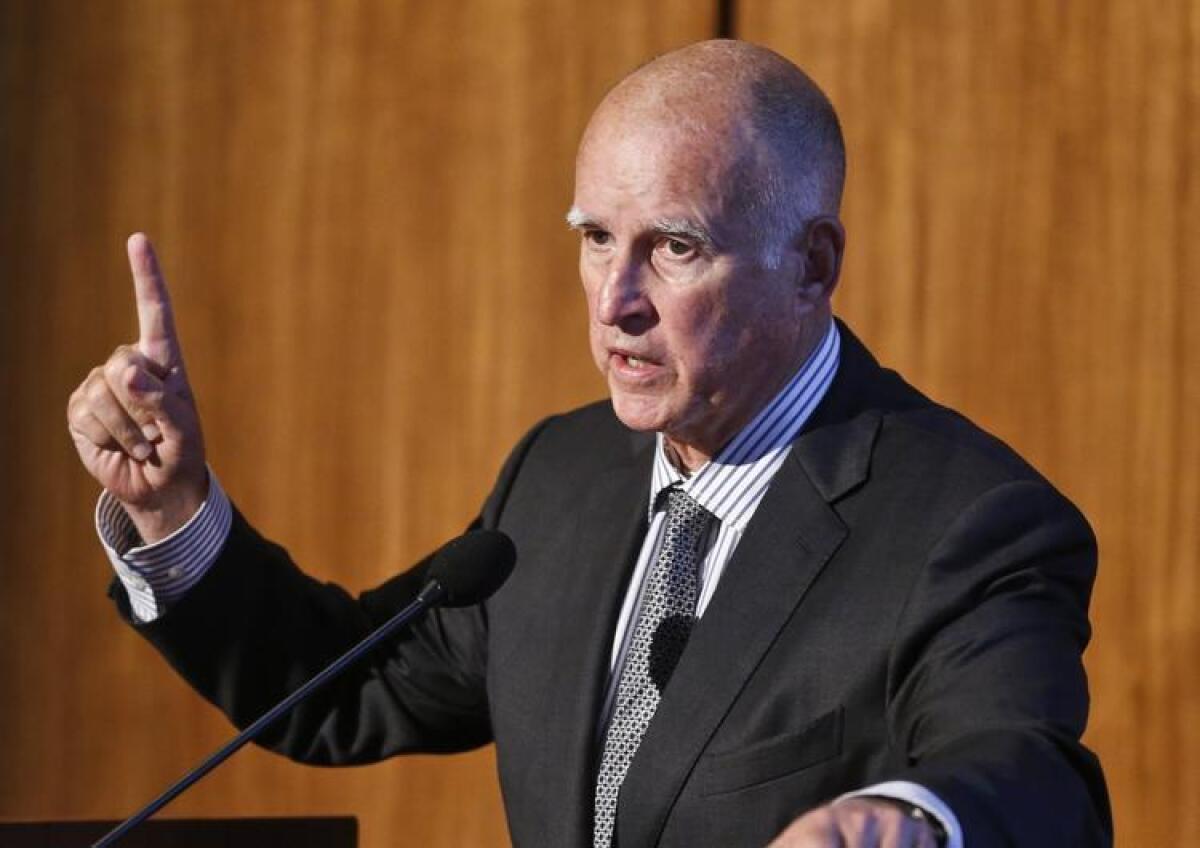
In a rare move, Gov. Jerry Brown said Friday he was allowing a bill increasing penalties for possession of date-rape drugs to become law without his signature.
Brown normally signs bills he supports or vetoes them if he doesn’t, but bills can become law if the governor fails to act by Friday’s midnight deadline. The governor’s representatives declined to explain his decision, but Brown has in the past been reluctant to approve bills that added to prison overcrowding.
The measure by Sen. Cathleen Galgiani (D-Stockton) targets drugs that cause victims to become completely incapacitated, leaving them with no memory of their assault.
The bill restores the authority of county prosecutors to pursue felony charges against individuals caught with the most common date rape drugs and who have also demonstrated the intent to commit a sexual assault. It addresses a change in the authority that was included in Proposition 47, previously approved by voters.
“The issue of sexual assault has received increased attention in both state and national media recently as California’s inadequate sexual assault laws have been brought to light,” Galgiani said in a statement.
- Share via
New law aims to help keep sexual assault survivors’ addresses private
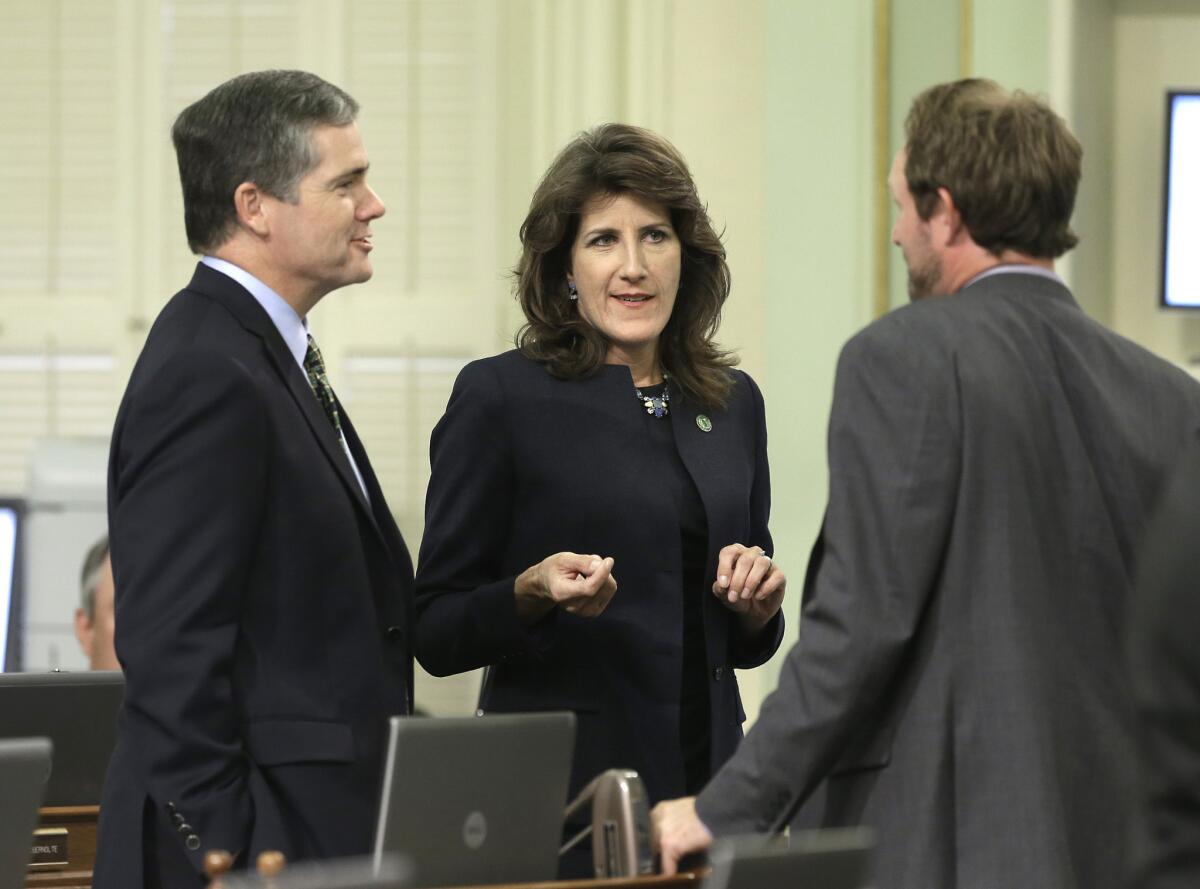
Protections to keep domestic violence survivors’ addresses confidential will be standardized under a bill the governor signed Friday.
The new law will also apply to people who have been sexually assaulted or stalked and reproductive healthcare providers. It will prohibit people, businesses and associations from publishing the addresses of people protected under the law who have requested that their addresses be kept confidential.
The bill, authored by Assemblywoman Catharine Baker (R-San Ramon), will also require the California Secretary of State’s office to provide those protected under the law with information about how to keep their addresses private.
The law will take effect Jan. 1.
- Share via
Workers in small businesses will not get mandatory parental leave, after veto by Gov. Jerry Brown

Gov. Jerry Brown refused on Friday to extend parental leave requirements to Californians who work for some of the state’s smallest businesses, saying he worried about the plan’s impact.
In his final bill actions for the year, Brown vetoed Senate Bill 654 and its mandate of six weeks of unpaid leave for mothers or fathers at businesses that employ between 20 and 49 workers.
Current job protections for workers with new children are focused on businesses of at least 50 employees. The bill would have given these employees access to the state’s paid family leave program, with subsidies that are paid for through worker paycheck deductions.
Brown’s veto message said that he was concerned about the “impact” of the leave proposal on small businesses, and cited potential liability issues that could be resolved through a modified proposal in 2017.
The bill’s author, state Sen. Hannah-Beth Jackson (D-Santa Barbara), said in a statement that “everyone deserves the basic right to take time off to care for a newborn.”
- Share via
Ring the bells of freedom. Denim is now California’s official state fabric
- Share via
‘Yes to Prop 62’ releases new ads in campaign to abolish death penalty system broken ‘beyond repair’
Thirty-eight years ago, lawyer Ron Briggs and his father wrote the ballot initiative that brought the death penalty back to California. They worked tirelessly to get it passed, gathering petition signatures and mailing out literature.
But in a new online ad airing this weekend in support of Proposition 62, the November ballot measure that would abolish the practice, he tells viewers he made “a big mistake and you have been paying for it ever since.”
“I thought we’d save money,” he says in the ad. “Instead, we have wasted $5 billion on just 13 executions.”
The video is one of two commercials that will begin playing this weekend as paid content on Facebook to raise support for the proposition. Past efforts to end the death penalty in the state have tended to focus on moral arguments against state-sanctioned executions. This year, Prop 62 organizers said they also want to emphasize the cost to taxpayers’ pockets.
The second ad features a porcelain vase shattering on the floor as a voice says, “Sometimes something is so broken it just can’t be fixed.” It goes on to list what it calls the flaws in the state’s death penalty system: suspended executions, endless appeals and millions in legal fees.
Both Prop 62 videos tell viewers the measure will save the state $150 million a year.
But not all agree with its financial estimates. The proposition, which would replace capital punishment with life without parole, is one of two competing death penalty measures voters will weigh on the Nov. 8 ballot. Prop 66 aims to speed up the execution process by limiting the number of appeals that death row inmates can file and by expediting deadlines.
Prop. 66 supporters argue the Prop. 62 campaign has “wildly inflated” the costs of the death penalty system.
The “Yes on 62” campaign says it took its $5-billion estimate from a report by California’s Loyola Law School in 2011. But one of its authors told PolitiFact California that was the figure spent on the entire system since 1978 — not just the the cases of 13 death row inmates.
Briggs said he began to change his perceptions on the death penalty about a decade ago. “It is important for people to understand that 38 years ago we threw a pebble into the political pond, creating waves of unwanted effects,” he said.
This story has been updated with a comment from Briggs.
- Share via
Democrat who lost in the primary says he will vote for Republican Rep. Steve Knight in heated House race
Lou Vince, an L.A. police lieutenant who finished third in the 25th Congressional District’s primary contest this June, crossed party lines Thursday and said he will vote for Republican Congressman Steve Knight over Democratic lawyer Bryan Caforio in the heated congressional race that national Democrats are targeting as a potential seat pick-up.
In a letter sent to reporters Thursday, Vince said while he wants Democrats to win back Congress, Caforio is new to the district and “isn’t a member of this community and certainly doesn’t reflect the values of our district.”
Vince, who said he was asked to drop out of the race by Democratic Party leaders when Caforio entered, complimented Knight for his military service and career with the Los Angeles Police Department.
“Steve Knight isn’t perfect — I’ve opposed him on issues like climate change and healthcare,” he said in the letter. “But I know Steve, I’ve known him for many years. While we may disagree on policy issues, he is a man of integrity and genuinely believes he is doing the right thing.”
In the letter, Vince accused Caforio of misrepresenting his legal career on the campaign trail and promoting “false accusations about my professional conduct as a police officer.”
During the primary campaign, L.A. Weekly and other outlets reported on a lawsuit filled by Cecil Miller, who claimed Vince and another officer, Timothy Gallick, beat him in front of his family after Miller ran over Vince’s foot during a traffic stop in 2000.
The suit alleged one of the officers held Miller up while the other punched him in the face before Vince also punched a passerby in the face, according to the suit.
The case was eventually settled by the Los Angeles City Council for $150,000 and the matter was sent to the Los Angeles Police Commission, according to city records. The commission asked the LAPD to review the incident, but Police Commission Executive Director Richard M. Tefanka said they never received a report back from the department.
Caforio’s campaign denied spreading information about the suit or the settlement, which was covered by local press in 2002.
In response to Vince’s letter to reporters, Caforio’s campaign released a statement from Maria Gutzeit, a Newhall Water District board member, who also ran for the seat but dropped out and endorsed Caforio.
“After multiple failed campaigns, it’s disappointing that Lou Vince is standing with an extremist like Steve Knight, who is against a woman’s right to choose even in cases of rape, incest or when the life of the mother is at risk, and would be another vote for the Trump agenda,” she said.
- Share via
Will denim be California’s official state fabric? A decision looms
- Share via
Distributing secret recordings like those in Planned Parenthood case now a crime in California
Distributing secret recordings involving healthcare conversations will become a crime in California in 2017, under a new law inspired by the high-profile case involving videos of Planned Parenthood employees discussing abortion procedures.
Gov. Jerry Brown’s signature on Assembly Bill 1671 came after last-minute changes to the bill seeking to ensure journalists wouldn’t be prosecuted for the use of video, audio or transcripts they are given but did not help to record.
Existing law focuses on the illegal nature of the recording itself, not what happens to any copies of the recording.
Planned Parenthood, a sponsor of AB 1671, argued that the new law is necessary in the wake of the controversial videos taped by David Daleiden and other anti-abortion activists that purport to show Planned Parenthood employees illegally trafficking in fetal tissue.
The organization, which has not been found guilty of any wrongdoing, has insisted that the videos were manipulated and sparked a number of threats made to their medical providers and clinics.
In an emailed statement, Daleiden said the conversations recorded were not confidential. “California’s existing recording law and the new distribution provision are simply inapplicable to our work,” he said.
News organizations including the California Newspapers Publishers Assn. had opposed earlier versions of AB 1671. Late amendments sought to assure that only those involved in actually making the recording are subject to criminal prosecution for distributing it — not those, including reporters, who may receive it from another source.
“Gov. Brown sent a clear message to anti-abortion extremists that you cannot break the law in California or you will be held accountable,” said Kathy Kneer, president of Planned Parenthood Affiliates of California, in a statement on the signing of AB 1671.
Update 3:45 p.m. This story has been updated with comment from David Daleiden.
- Share via
More large electronic billboards are possible for downtown Los Angeles after governor’s action
More electronic billboards could be allowed in downtown Los Angeles under a new law signed Friday by Gov. Jerry Brown that community activists charge will add to visual blight in the city core.
The controversial bill allows developers to erect several giant electronic billboards around the $1-billion Metropolis high-rise project in downtown Los Angeles as long as they also are allowed by the city.
The measure is opposed by Dennis Hathaway, president of the Coalition to Ban Billboard Blight, who said it will create an atmosphere of flashing, changing electronic signs like Times Square in New York City and cause a dangerous distraction for motorists on nearby streets and the 110 Freeway. He also said it would create an eyesore.
“I’m really disappointed,” Hathaway said. “Having big, multistory advertisements for things like beer and Coca-Cola is not the highest and best use of the visual environment.”
He also said the law sets a bad precedent for allowing a developer to get legislators to grant exemptions from state sign laws limiting billboards near freeways.
Assemblyman Miguel Santiago (D-Los Angeles) said his measure is aimed at helping the economic revitalization of a downtown neighborhood. The measure is needed to provide some financial incentive for developers to revitalize the city core now that redevelopment agencies have all been shut down, the lawmaker added.
Billboards can provide extra revenue to help make developments more profitable, he said. The bill provides exemption from the Outdoor Advertising Act for an area bounded by West 8th Street on the northeast, South Figueroa Street on the southeast, Interstate 10 on the southwest, and State Route 110 on the northwest, and to a nearby area on the westerly side of State Route 110 bounded by West 8th Place, James M. Wood Boulevard and Golden Avenue.
“I’m hoping it will spark up the much-needed revenue to make development happen in downtown Los Angeles and create thousands of jobs and hopefully become more of a world city,” Santiago said Friday, adding it could help the area targeted to become “an anchor like we saw with L.A. Live.”
Santiago said the city of Los Angeles, which will have final say on any signage, has lost $5 billion in economic development over the last four years alone because of the lack of hotel rooms and an outdated Los Angeles Convention Center.
The Los Angeles Metropolis project, which includes 350 hotel rooms, is a 6.3-acre, $1-billion development adjacent to LA Live that is expected to bring $156.7 million in tax revenue into the city over the next 25 years, he said.
Brown also signed a bill exempting two existing advertising billboards along Interstate 405 in Inglewood from the Outdoor Advertising Act restrictions on changeable, electronic signs through Jan. 1, 2023.
- Share via
Stronger equal-pay protections for women and people of color coming soon in California
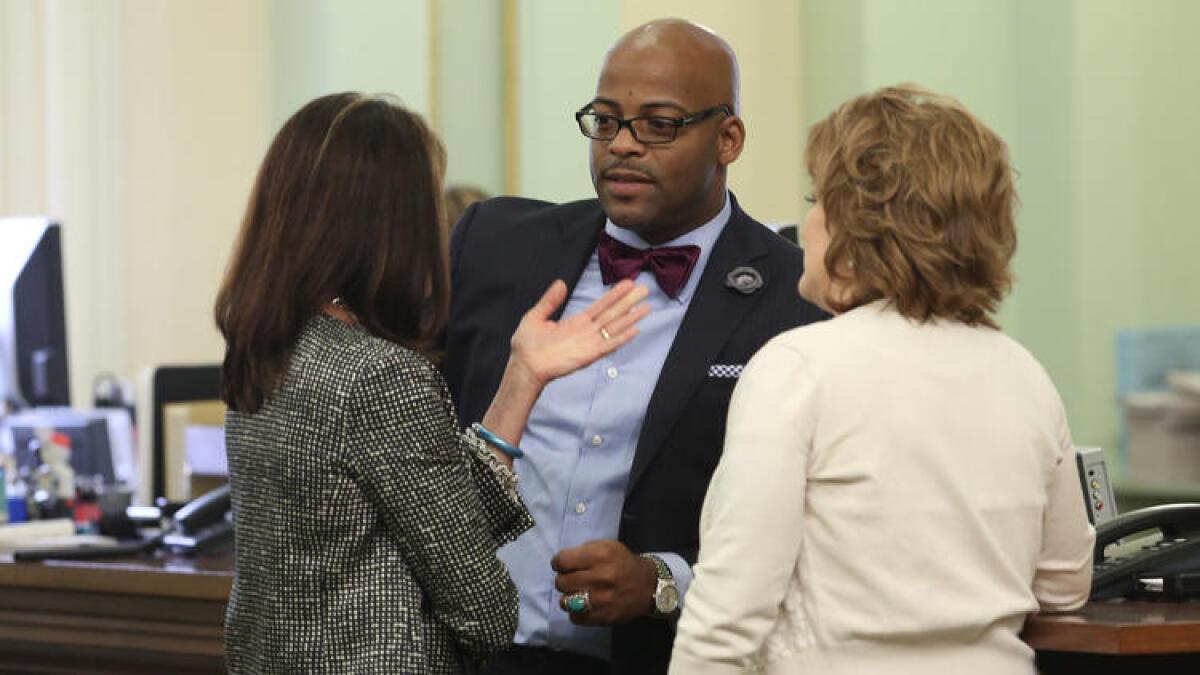
Equal-pay laws in California will get tougher under two bills Gov. Jerry Brown signed Friday.
The two new laws will strengthen wage-equity protections for women and people of color.
One will prohibit employers from paying women less than male colleagues based on prior salary. The other will bar employers from paying workers doing “substantially similar” jobs different wages based on their race or ethnicity.
The announcement comes less than a year after California lawmakers passed one of the toughest equal-pay bills in the country. That law applied the “substantially similar” provision to protect against gender-based wage discrimination.
The bills signed Friday take effect Jan. 1.
- Share via
California toughens laws against rape after Brown signs bills inspired by Brock Turner case

Gov. Jerry Brown on Friday signed legislation that expands the legal definition of rape and imposes new mandatory minimum sentences on some sexual assault offenders -- measures inspired amid national outcry over the sexual assault case of former Sta
Gov. Jerry Brown on Friday signed legislation that expands the legal definition of rape and imposes new mandatory minimum sentences on some sexual assault offenders -- measures inspired amid national outcry over the sexual assault case of former Stanford swimmer Brock Turner.
The decision comes as heated debate has raged this year over the mishandling of sexual assault investigations on U.S. college campuses by police agencies and courts. But increasing punishment for sex offenders posed a challenge for Brown, as the state has been undertaking a broader effort to move away from a focus on prison sentences.
In a message released with his signature, Brown said he was generally opposed to adding more mandatory minimum sentences.
“Nevertheless, I am signing AB 2888, because I believe it brings a measure of parity to sentencing for criminal acts that are substantially similar,” he said.
Assembly Bill 2888, authored by Assemblyman Evan Low (D-Campbell) and Assemblyman Bill Dodd (D-Napa), will prohibit judges from giving convicted offenders probation when they sexually assault someone who is unconscious or intoxicated.
Assembly Bill 701 by Assemblywomen Cristina Garcia (D-Bell Gardens) and Susan Talamantes Eggman (D-Stockton), will expand the legal definition of rape so it includes all forms of nonconsensual sexual assault.
Currently under the law, those convicted of rape using additional physical force must serve prison time. But offenders, like Turner, convicted of sexually assaulting someone who is unconscious or incapable of giving consent because of intoxication, can receive a lesser sentence based on a judge’s discretion.
Rape has previously been defined as “an act of sexual intercourse” under certain conditions of force, duress or lack of consent. Other types of sexual assault, like penetration by a foreign object, were categorized as separate offenses.
The laws go into effect on Jan. 1, 2017.
- Share via
Gov. Jerry Brown makes it crystal clear: He really doesn’t like ranked-choice voting
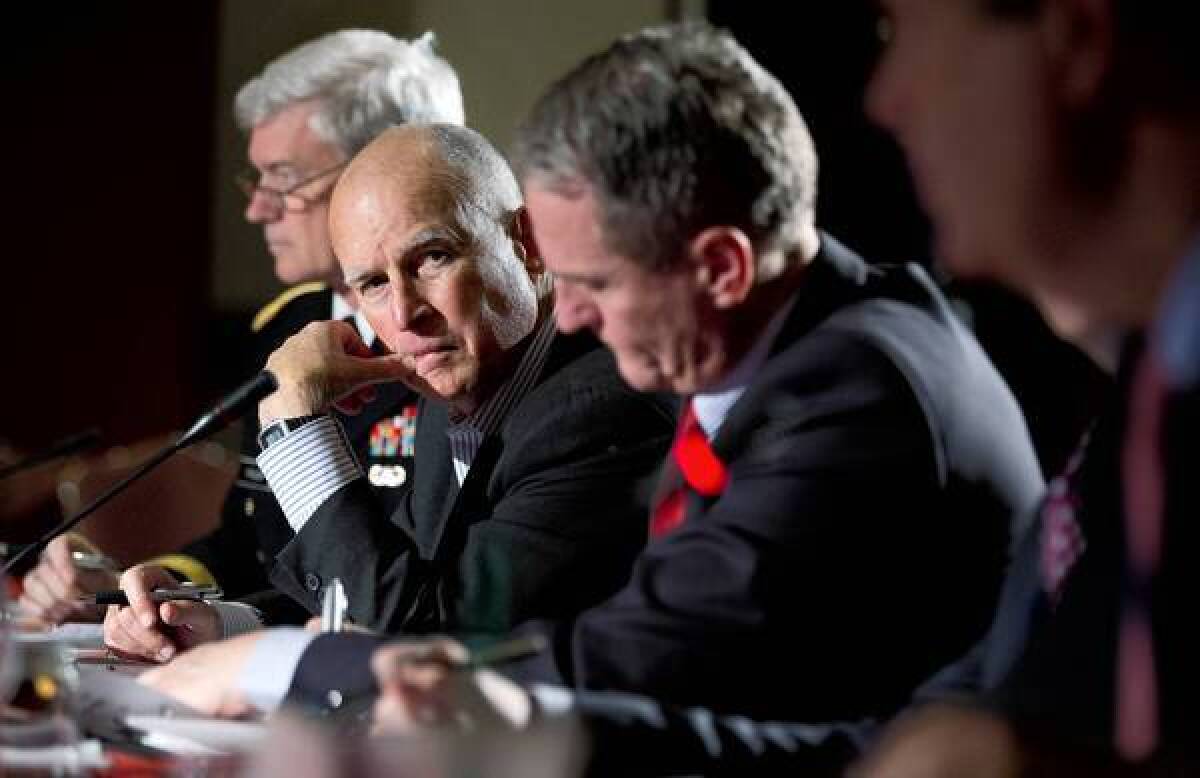
An effort to expand the use of ranked-choice voting in California, in which voters choose second- and third-choice candidates, was struck down by Gov. Jerry Brown this week with a pretty simple message.
He just doesn’t like it.
“Ranked choice voting is overly complicated and confusing,” wrote Brown in his veto message on Thursday.
The system is currently only in use in a handful of Bay Area elections, most notably used in cities such as San Francisco and Oakland.
Senate Bill 1288 would have allowed a number of California cities, counties and school districts to switch to the system that asks voters to rank their top candidate preferences.
The candidates receiving the most votes then move on to successive “rounds” where ballots that picked a now defeated candidate as the top choice are then redistributed based on the voters’ next preference.
Brown certainly knows about ranked-choice voting as a former Oakland mayor and, until recently, an Alameda County resident. His veto message seemed not only a succinct rejection of SB 1288, but ranked-choice voting in general.
“At a time when we want to encourage more voter participation, we need to keep voting simple,” he wrote in his veto message. “I believe it deprives voters of genuinely informed choice.”
- Share via
Few new rules on the use of drones as governor rejects ‘piecemeal’ approach to regulation

In a win for lobbying efforts in a budding industry, California has made it through another year with few limits on drones in its skies.
Gov. Jerry Brown on Thursday signed legislation that protects emergency responders and volunteers from liability should they damage a drone in the course of their work. But he vetoed the last four pending drone bills, saying he found it “more prudent to explore a more comprehensive approach” to the regulation of unmanned aircraft systems.
As drones have multiplied in number and category, lawmakers in the 2016 legislative session had attempted to come up with a comprehensive approach. But drone manufacturers and associations boosted their politicking, successfully beating back several bills they said would create a patchwork of laws that vary by state and hinder innovation.
Of the bills Brown vetoed, one would have banned the use of drones in state parks without permission. Another would have made the use of drones unlawful during illegal activities such as violating a protective order, interfering with emergency response personnel or facilitating the delivery of contraband to jails.
In messages released with his veto signature, Brown said current laws were sufficient to prosecute those crimes, while authority fell to the appropriate parks and wildlife departments to develop their own regulatory approach on their properties.
Brown also rejected a bill mandating that drones be sold with a copy of FAA rules and that those with GPS technology must be turned off near airports, sensitive infrastructure or fires.
To that proposal, Brown said it created “significant regulatory confusion by creating a patchwork of federal, state and local restrictions on airspace.”
“Piecemeal is not the way to go,” he said.
- Share via
California is removing all limits on who can drop off your ballot on election day
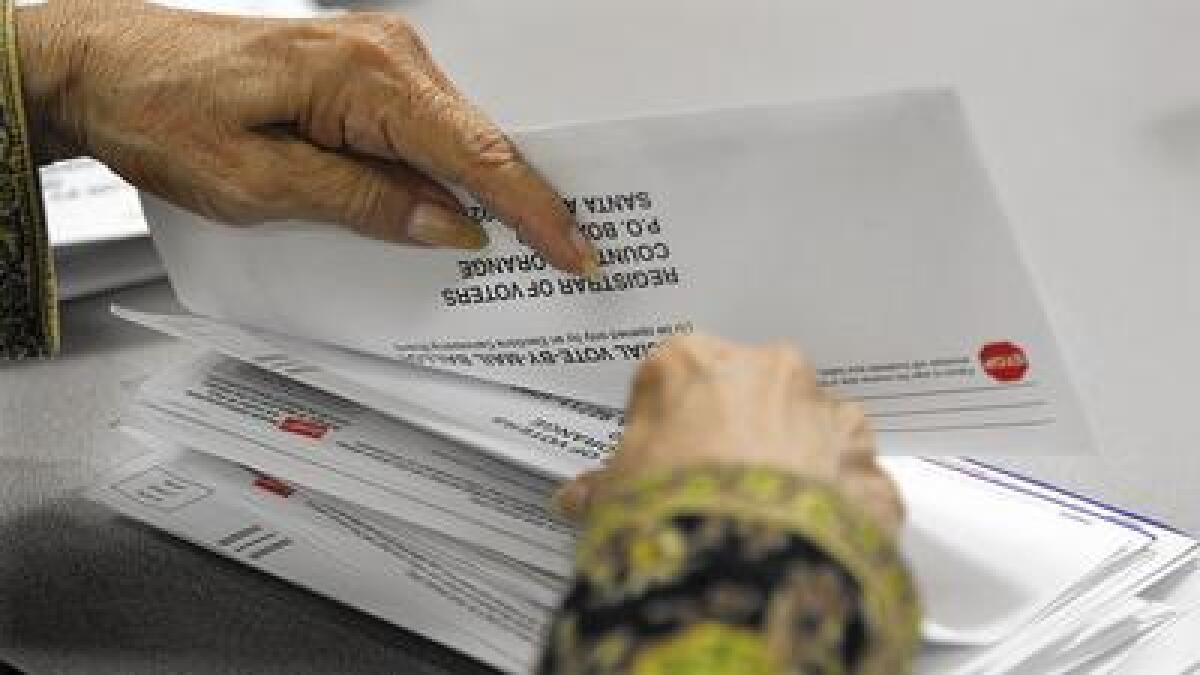
Californians will be able to legally hand off their sealed ballot to anyone to mail or deliver in person under a new law signed Thursday.
Assembly Bill 1921, written by Assemblywoman Lorena Gonzalez (D-San Diego), removes language in state election law that limits the delivery of a voter’s ballot to close family or household members.
It also repeals, starting in local elections in 2017 and the next statewide election in 2018, the current ban on a volunteer campaign worker from gathering as many ballots as possible from voters for delivery to elections officials. The only restriction is that a campaign official cannot be paid to gather and deliver ballots.
While other states also have more liberal laws on who can deliver a voter’s ballot, those states usually place a limit on how many ballots can be delivered by a single person. The law signed by Gov. Jerry Brown places no such restrictions.
Supporters of the new law said that limits on who could deliver a voter’s ballot were an unnecessary obstacle in an era when millions more Californians are choosing to cast their ballots by mail.
- Share via
Single-user restrooms to become ‘gender neutral’ in California
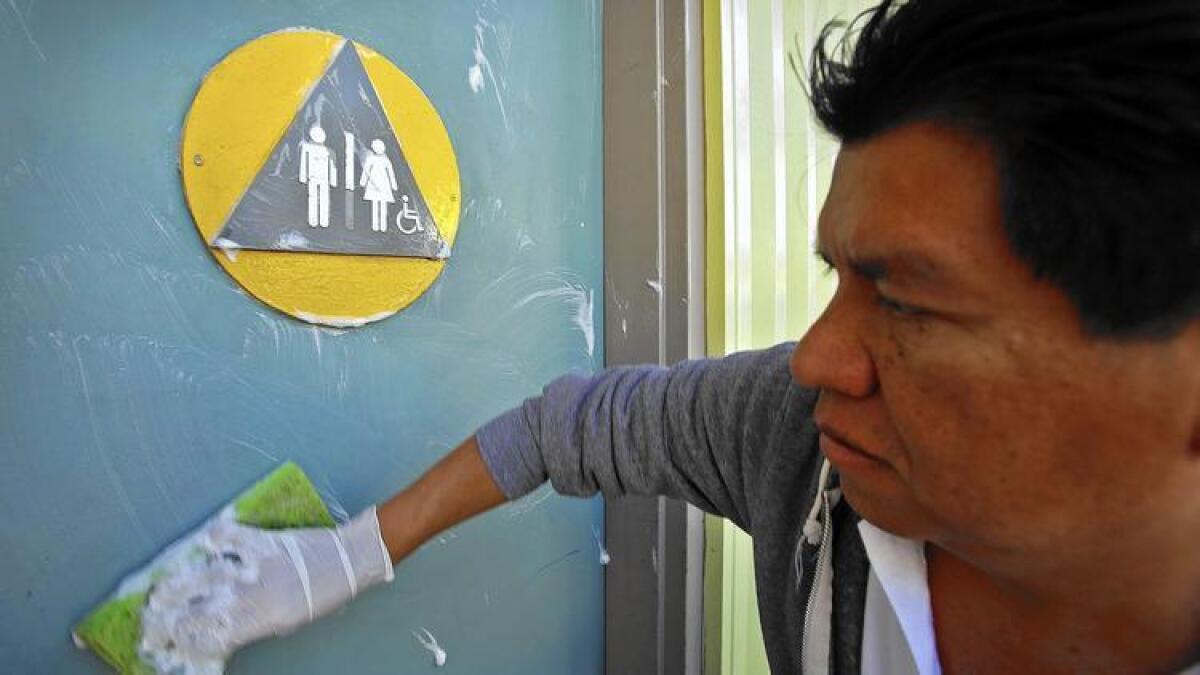
Single-user bathrooms in public buildings in California will soon become “gender neutral” so anyone can use any restroom, a result of legislation signed Thursday by Gov. Jerry Brown.
Assemblyman Phil Ting (D-San Francisco) said his bill moves California in the opposite direction of some states that restricted the ability of transgender people to choose which bathrooms to use.
“California is charting a new course for equality,” Ting said in a statement. “Restricting access to single-user restrooms by gender defies common sense and disproportionately burdens the LGBT community, women, and parents or caretakers of dependents of the opposite gender.”
He noted that 19 states this year have considered restricting access to restrooms, locker rooms and other facilities based on the user’s biological sex.
The new law in California was championed by Equality California, a gay rights group that cited a 2013 study by the UCLA Williams Institute that found 70% of transgender and gender non-conforming people face serious threats, including verbal harassment, when using gender-specific restrooms.
“This law is a simple measure that will make everyone’s lives easier,” added Kris Hayashi, executive director of the Transgender Law Center.
The law takes effect March 1, 2017, to allow businesses time to change restroom signs and otherwise comply.
- Share via
More Californians will vote by mail and fewer at polling places under a new law
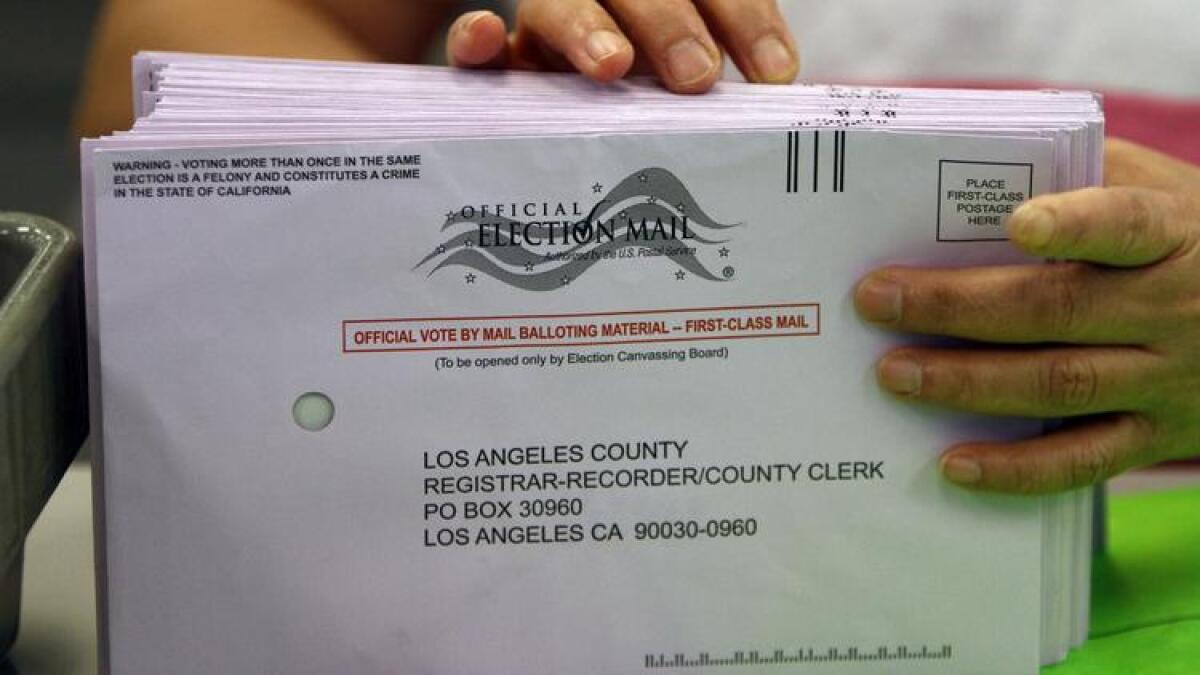
California voters may be asked to cast more of their ballots by mail as soon as 2018 under a sweeping law signed Thursday, one that would eliminate thousands of neighborhood polling places.
Gov. Jerry Brown’s signature on Senate Bill 450 sets in motion a major remodeling of the state’s election operations, inspired by a similar system in Colorado. Counties that opt to implement the new system will open community “vote centers” in the weeks before election day that offer last-minute registration and limited in-person voting.
Those counties will also have more places to drop off completed ballots.
“This landmark law will provide voters more options for when, where, and how they cast a ballot,” said Secretary of State Alex Padilla in a written statement.
But the move away from polling places could some as a surprise to Californians who have spent decades voting in their neighborhoods. A report released two weeks ago by UC Davis’ California Civic Engagement Project found the “vote center” model raised fears with some African Americans about voter suppression and voting access.
Supporters of the new law say voter education efforts will be key to making it work.
The changes to election operations will come in two stages: 14 counties will be able to move toward less in-person voting in 2018, and the remaining counties will be allowed to opt in to the new system in 2020. Counties that implement the new system will have to mail ballots to all registered voters, though Los Angeles County will not have to do so until 2024.
- Share via
When are marijuana users dangerous drivers? Gov. Brown approves study to find out

Gov. Jerry Brown on Thursday signed a series of bills preparing California for a new era of marijuana regulation, including one launching a study of the effects of cannabis on motor skills.
Brown also approved measures preserving small medical marijuana growing operations from bigger competitors and allowing cannabis dispensaries to pay taxes and fees in cash.
However, Brown vetoed bills that would have allowed 135 cannabis dispensaries to operate in Los Angeles without city licenses as well as provided a tax amnesty to medical cannabis dispensaries that owe back taxes,
The governor’s decisions follow his approval last year of a new system of regulating and licensing the growth, distribution and sale of medical marijuana beginning in 2018.
The governor’s action Thursday also comes as California voters are set in November to consider an initiative that would legalize the recreational use of marijuana.
Assemblyman Ken Cooley (D-Rancho Cordova) authored the measure calling for a University of California study of marijuana’s physical impacts.
“This bill addresses the issue of the lingering effects of medical marijuana on motorists, which is a very important piece for public safety,” Cooley said. “A lot of medical marijuana issues affect the person using it, but when they are on the roads everyone is affected.”
Police agencies have struggled with enforcing laws against driving while impaired after using marijuana because there is not the same amount of research as exists with the effects of alcohol.
“Law enforcement needs the best informed understanding of those effects in order to deal with suspected cases of drugged driving from marijuana,” Cooley said.
The measure also sets standards for processing marijuana that, if met, will allow medical cannabis manufacturers to operate without threat of state law enforcement action.
Brown also approved a bill that will allow medical pot businesses to pay the state with cash and not face steep penalties that currently exist.
The bill was proposed because marijuana possession and sale is still illegal under federal law, so banks will not accept business from medical marijuana dispensaries. That makes it impossible to write checks or do electronic transfers to pay taxes and fees to the state.
The governor also signed a measure aimed at protecting small medical marijuana farms by creating a special state license for “cottage” operations of less than 5,000 square feet.
However the governor vetoed a measure that would have exempted 135 marijuana stores in Los Angeles from a requirement that they get a city license. The stores were grandfathered in when voters approved a ballot measure in 2013.
He noted the measure conflicts with state law requiring dispensaries to get licenses from both the state and the city.
“This bill is inconsistent with dual licensing requirement established last year by the Medical Cannabis Regulation and Safety Act,” Brown wrote in his veto message.
He also nixed a bill that would have provided tax amnesty to hundreds of dispensaries throughout California that are believed to be delinquent on about $106 million in back taxes.
“While increasing tax compliance among medical marijuana businesses is important, it is premature to create a tax amnesty before the regulations that link enforcement to licenses are promulgated,” Brown wrote in the veto message.
- Share via
California now subject to tighter rules for taking property from those who haven’t been convicted of a crime
California will now have much stricter rules for when police can seize citizens’ cash, cars and other property under legislation signed Thursday by Gov. Jerry Brown.
The measure, SB 443 from Sen. Holly Mitchell (D-Los Angeles), now requires a criminal conviction before law enforcement can permanently take from a suspect assets valued under $40,000, ending what supporters have said is a practice that incentivized officers to target low-income residents to pad their police budgets.
A more wide-ranging bill from Mitchell failed last year amid significant concern from law enforcement organizations that a requirement to obtain a criminal conviction before the permanent seizure of any property would harm police’s ability to target high-level drug dealers. After Mitchell agreed to the $40,000-threshold for a criminal conviction, major law enforcement groups dropped their opposition to the measure and the bill easily cleared the Legislature with bipartisan support last month.
California is now one of 18 states that have tightened similar laws regarding what’s known as “civil asset forfeiture” in the last two years, according to the libertarian Institute for Justice, which tracks asset forfeiture across the country. Other states have banned the practice entirely, but California’s new policy for permanent seizures of property is among the strongest in the country, the organization said.
- Share via
More California communities could see public financing of campaigns under a law signed by Gov. Brown
More cities and counties will be able to offer public funds for political campaigns under a law signed Thursday by Gov. Jerry Brown.
Brown’s signature on Senate Bill 1107 makes public financing an option, though it does not require any local government to participate.
The bill was a major goal of watchdog groups critical of the influence of money in politics. They have suggested that the communities that allow limited public funds can then match those dollars with requirements for candidates to seek out small donations, ones that come from diverse parts of a community instead of a handful of big donors.
“California’s leaders are hearing from voters who are fed up with playing second fiddle to wealthy special interests,” Kathay Feng, executive director of California Common Cause, said in a written statement. “SB 1107 gives Californians new options to amplify the voices of everyday voters in election campaigns.”
While a few California cities already offer some form of public financing for campaigns, dozens more were banned from doing so under a 1988 ballot measure. The new law removes that ban.
- Share via
Californians will soon be allowed to take selfies with their completed ballots
Ballot selfies soon will be legal in California under a law the governor signed Thursday that permits voters to photograph their completed ballots.
Residents hoping to take a selfie with their vote in the upcoming presidential election are out of luck, however. The bill will go into effect Jan. 1, after the national election in November.
The first time Californians will be able to exercise their new right will be in local elections next year.
Supporters of the bill have said it protects Californians’ rights to engage in political speech.
For now, Californians are still prohibited from showing others their ballots after they have marked them, although the bill’s author, Marc Levine (D-San Rafael), told the Los Angeles Times in January that no Californian has ever been prosecuted for taking a ballot selfie.
- Share via
For Kamala Harris’ Senate campaign, the state Democratic Party’s endorsement has been a jackpot
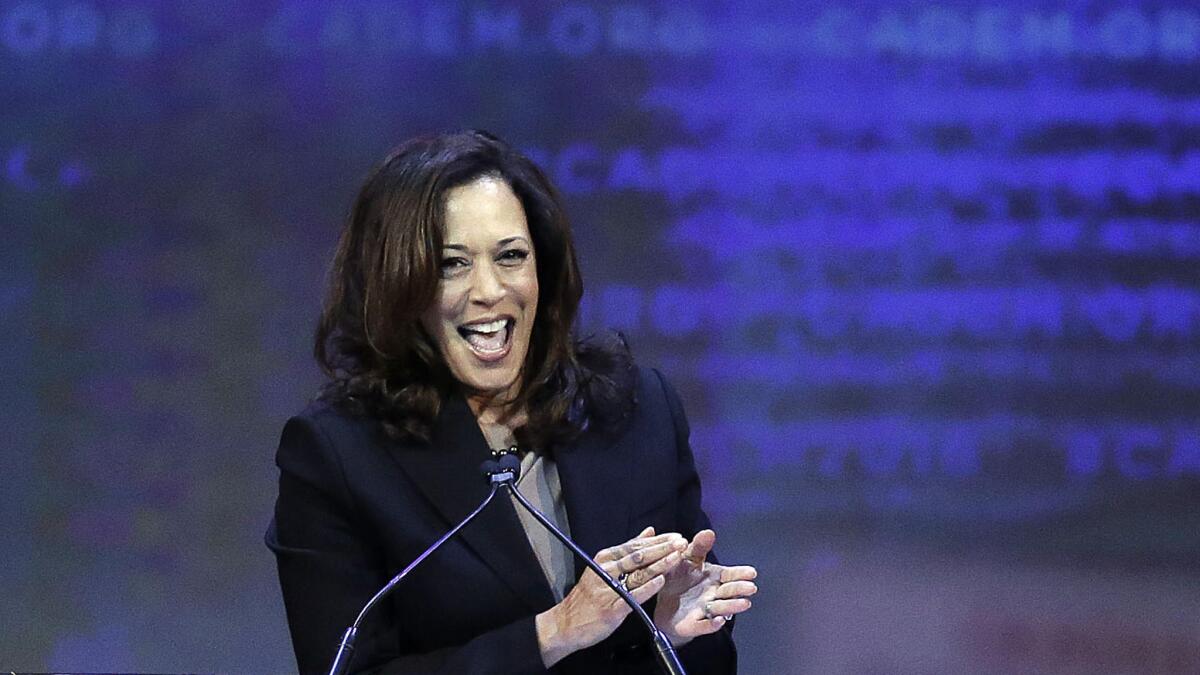
In California, it pays to be the state Democratic Party’s endorsed candidate.
The California Democratic Party has spent more than $500,000 supporting Democratic state Atty. Gen. Kamala Harris for U.S. Senate, and forked over another $100,000 for campaign materials promoting her bid.
Harris overwhelmingly won the state party’s endorsement in February, and now the party is all in to make sure she wins in November.
Her rival, Orange County Rep. Loretta Sanchez, is getting nothing from the state party even though, like Harris, she’s a Democrat.
The party help for Harris could tip the balance in a race where both candidates have had a hard time raising money for their campaigns.
- Share via
Nanette Barragán scores endorsement from Bernie Sanders-affiliated group in south L.A. County congressional race
Another day, another endorsement for former Hermosa Beach City Councilwoman Nanette Barragán in the race to replace outgoing Rep. Janice Hahn (D-San Pedro) in the 44th Congressional District.
Barragán, who is running against state Sen. Isadore Hall III (D-Compton), scored the endorsement of Our Revolution, a political 501(c)(4) nonprofit that sprung up after Vermont Sen. Bernie Sanders’ failed presidential bid to support down-ballot, progressive candidates.
Hall beat Barragán in June’s crowded primary election, with 40% of the vote to Barragán’s 20%.
But Barragán’s strategy of hitting Hall for his ties with special interests in the oil, alcohol and tobacco industries has helped her win a number of endorsements from progressive and environmental groups.
“Nanette Diaz Barragán understands there’s nothing more important than the health of our families and community,” the group writes in its endorsement. “That’s why she stood up to the big oil companies and helped win the fight to keep them from oil-drilling in our neighborhoods and off our beaches.”
This week, Barragán has been endorsed by the Progressive Change Campaign Committee and the Torrance newspaper the Daily Breeze, which covers the South Bay cities of Los Angeles County.
Both candidates were running low on cash as of their last filings with the Federal Election Commission: Hall had $132,836 in the bank, and Barragán had $127,775.
Our Revolution has already dabbled in a number of races around California including the crowded race to replace longtime Berkeley Mayor Tom Bates.
The group has also endorsed Eloise Reyes, who is challenging Assemblywoman Cheryl R. Brown (D-San Bernardino) — another intra-party race in which one of the candidates, Brown, has been criticized for accepting campaign contributions from oil companies.
- Share via
More transparency is coming to California’s scandal-ridden energy regulator, and Gov. Brown has pledged more action

Changes to increase the transparency of communications between the state’s energy regulator and the industries it oversees are now law after Gov. Jerry Brown signed five measures designed to restructure the California Public Utilities Commission.
Most notably, Brown signed a bill from Sen. Mark Leno (D-San Francisco) that would open up some details of private meetings between industry and PUC executives — a response to numerous concerns about an overly cozy relationship after the 2010 San Bruno natural gas pipeline explosion and the circumstances surrounding the 2013 closure of the San Onofre nuclear power plant in Southern California.
“The reforms approved by the governor today will ensure commissioners disclose their private meetings with utility executives and will result in heavy penalties for those who violate the rules,” Leno said in a release.
The bills signed Thursday were part of an overhaul of the agency first announced in June by Brown and legislative leaders. But major components of that deal failed to pass the Legislature this year, and fingers have been pointed at Brown-appointed PUC President Michael Picker, who had last-minute hang-ups over parts of the legislation, Democratic leaders who failed to bring the bills up for a vote and Republican leaders who refused to waive legislative rules to allow a last-second decision on the package.
In his bill-signing message, Brown announced that he would ask the PUC to directly implement changes called for in many pieces of legislation that did not pass the Legislature. Those changes include appointing an ethics ombudsman, transferring some oversight over Uber, Lyft and other ride-hailing companies out of the PUC’s control and studying whether telecommunications regulations should be transferred to a different agency.
“These important reforms cannot wait another year,” Brown said.
The governor also said that he would continue to work with the Legislature next year to pass into law all parts of the overhaul that failed.
“The governor continues to support the entire package of reforms announced in June, and it’s disappointing all the legislation did not get to his desk,” Brown spokesman Evan Westrup said.
- Share via
Four California Democrats headed to Israel for Shimon Peres’ funeral
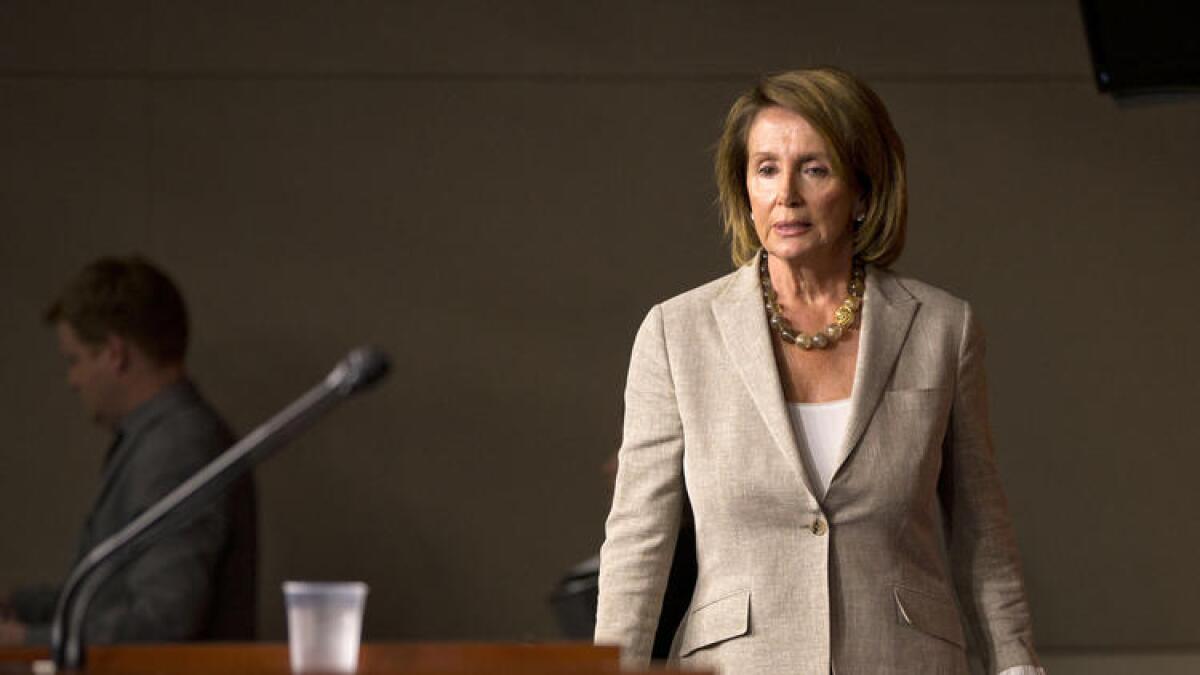
House Minority Leader Nancy Pelosi (D-San Francisco) and Reps. Susan Davis (D-San Diego), Adam Schiff (D-Burbank) and Alan Lowenthal (D-Long Beach) are on their way to Israel to attend the funeral of former Israeli President Shimon Peres.
The California members were asked to join President Obama and a delegation of U.S. officials at the Friday funeral in Jerusalem, according to the White House.
Peres, a Nobel Peace laureate and creator of Israel’s nuclear program, died Tuesday following a stroke. He was 93.
During House votes Wednesday, members huddled to tell personal stories about Peres as they waited to sign a book of condolences for his family.
Flags were flown at half-staff in Washington on Thursday to honor Peres.
- Share via
Gov. Brown takes another step in developing system to provide early warning of earthquakes

Gov. Jerry Brown on Thursday signed a bill that continues the move toward the development of a statewide early warning system for earthquakes.
The measure creates a California Earthquake Early Warning Program and Advisory Board within the California governor’s Office of Emergency Services to work on the system.
The measure requires the Earthquake Early Warning Program business plan to be developed and submitted to the Legislature by Feb. 1, 2018.
“We’ve seen the devastation earthquakes have caused in California,” Brown said in a statement. “This keeps us on track to build a statewide warning system that can potentially save lives.”
Three years ago, Brown approved a bill that required the creation of a statewide earthquake warning system by a partnership between the state and the private sector.
And this year, Brown directed that $10 million in the budget go to Cal OES to further expand the state’s earthquake early warning system prototype, called ShakeAlert.
The latest bill was authored by Sen. Jerry Hill (D-San Mateo).
“The early earthquake warning system will help save lives,” Hill said Thursday. “In emergencies, every second counts and the urgent alerts that will be sent by the warning system can help prevent devastating and life-threatening missteps.”
- Share via
Gun-control advocate and shooting victim Gabrielle Giffords endorses Kamala Harris for U.S. Senate

State Atty. Gen. Kamala Harris receives an endorsement from Gabby Giffords and her husband, Mark E. Kelly, in her run for U.S. Senate.
Gun-control advocate and former U.S. Rep. Gabrielle “Gabby” Giffords, who was shot during a 2011 outdoor appearance in her Arizona district, on Thursday endorsed state Atty. Gen. Kamala Harris in California’s U.S. Senate race.
Giffords announced her endorsement of Harris during a morning news conference in Beverly Hills. Her husband, retired Navy Capt. Mark E. Kelly, a former space shuttle astronaut, also endorsed Harris.
Six people were killed and 12 others wounded in the Tucson shooting rampage that left Giffords severely injured. Giffords retired from Congress following the shooting and with Kelly founded Americans for Responsible Solutions, a political action committee that advocates for increased gun control.
Giffords’ assailant, Jared Loughner, had been diagnosed with paranoid schizophrenia. He was sentenced to life in prison in November 2012.
The Harris campaign has criticized her rival in the Senate race, U.S. Rep. Loretta Sanchez (D-Orange), for voting in favor of legislation in 2005 that shielded the gun industry from liability for the criminal or negligent acts of gun owners with certain exceptions.
The law, the Protection of Lawful Commerce in Arms Act, was approved by Congress and signed by President George W. Bush. The bill superseded existing laws in California and other states that allowed victims of gun violence to sue gun makers and dealers.
The Brady Campaign to Prevent Gun Violence also has endorsed Harris in the Senate race, and the group’s president, Dan Gross, referred to the 2005 vote by Sanchez when the endorsement was announced.
Harris also has faced criticism on the gun issue, however. The state auditor as recently as 2015 criticized the state Department of Justice, overseen by Harris, for delays in determining whether potentially dangerous people own guns in violation of state law. The backlog posed a “continued risk to public safety,” according to an auditor’s report.
The Justice Department cross-references databases to find people who legally purchased guns before they became ineligible under state law because of a severe mental illness or their criminal history. Californians on the banned list have their guns confiscated by law enforcement authorities.
“No endorsement can hide Kamala Harris’ failed record to keep guns away from criminals and people with mental illness putting public safety at risk,” Sanchez campaign spokesman Luis Vizciano said in a statement released Thursday afternoon.
After Thursday’s press conference, Harris was asked about her position on Proposition 63, which would require background checks on people purchasing ammunition, outlaw ammunition magazines that hold more than 10 rounds and provide a process for taking guns away from Californians convicted of felonies.
Harris said because her office is responsible for writing the title and summary voters see on the ballot she was not taking a position on the proposition.
She said she is in favor of expanded gun safety laws like universal background checks, however.
“It is just reasonable to say that we want to know if someone has been convicted of a serious or violent felony before we let them purchase a lethal weapon,” she said.
Harris also declined to comment about Wells Fargo & Co., which was sanctioned by state Treasurer John Chiang Wednesday over the bank’s fake accounts scandal.
“I cannot talk about any of our investigations,” she said.
- Share via
Why California’s U.S. Senate candidates are on their own as the national Democratic Party sits the race out
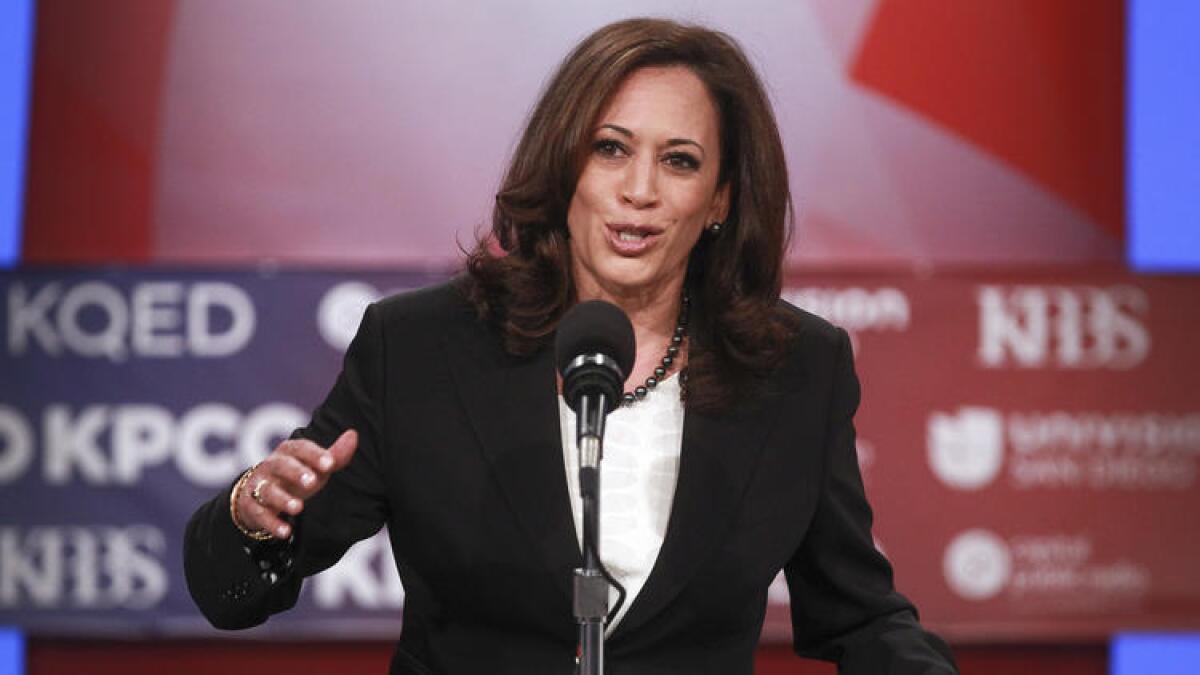
On paper California’s U.S. Senate race looks like it would draw a lot of national attention and interest, but because it is between two Democrats, the national party isn’t playing a role.
Still, that doesn’t mean sitting senators aren’t weighing in on who they want to work with: Nineteen of 44 sitting Democrats and three retired senators have contributed to the campaign of Atty. Gen. Kamala Harris, only one has also donated to Rep. Loretta Sanchez (D-Orange).
- Share via
The state will cover $250 million in costs if L.A.’s Olympics bid goes over budget
California will provide up to $250 million in guarantees should the city of Los Angeles go over budget in its bid to host the 2024 Summer Olympic Games and Paralympic Games under legislation Gov. Jerry Brown signed Thursday morning.
The decision comes as the Los Angeles City Council is weighing its latest bid to host the games amid questions about its cost and the city’s liability should financial estimates prove low. The legislation, authored by Senate President Pro Tem Kevin de León (D-Los Angeles), will provide a financial backstop from the state in case of a budget shortfall. Bid leaders have estimated the Games could cost more than $6 billion, but believe sponsorships, broadcasting rights and other revenue streams will more than cover the price tag.
Paris and Budapest are competing with Los Angeles to host the Games, and the International Olympic Committee will choose a host city next September.
- Share via
Santa Barbara TV station threatens legal action after GOP congressional candidate uses news clip in attack ad
The owner of a Santa Barbara TV news station is threatening legal action against a Republican congressional candidate after his campaign released an attack ad featuring a 10-second clip from the station’s newscast.
KEYT-TV General Manager Mark Danielson wrote a letter to Republican Justin Fareed’s campaign Wednesday saying the station had “not authorized or consented to any such use of its copyright protected news content in this political advertisement.”
The ad features news anchor C.J. Ward reporting on a comment Democratic Santa Barbara County Supervisor Salud Carbajal made this month referring to the city of Lompoc as the “armpit” of the coastal county.
“In addition to being a violation of law, the use of KEYT’s news content and the voice and likeness of its anchor also undermines the trust KEYT has built with its viewers,” Danielson wrote in the letter. “Maintaining the objectivity of its news operations is of the utmost importance to KEYT.”
The letter demands that Fareed’s campaign “cease and desist from the unauthorized use” of the station’s content and the voice and likeness of Ward, or “KEYT may take appropriate legal action to protect its rights.”
Danielson said the station was not taking a position in the heated race between Fareed, a 28-year-old former U.S. House staffer, and Carbajal.
The race to replace outgoing Rep. Lois Capps (D-Santa Barbara) has become one of the most expensive in the U.S. thanks to a number of attack ads funded by super PACs affiliated with both parties.
On Thursday, Fareed campaign manager Christiana Purves responded to the letter saying, “Our campaign is well within its legal right to use footage of a news broadcast outlining Carbajal’s offensive comments.”
Purves shared a letter sent by attorney Charles H. Bell Jr., a Sacramento attorney who has represented California Republicans in high profile legal disputes, to the station Thursday. Bell writes: “The use of a brief segment of your news report, which does not use KEYT’s trademark or logo, constitutes a ‘fair use’ of copyrighted material for political purposes expressly permitted by copyright law and case law.”
This post was updated at 12:20 with a comment from Fareed campaign manager Christiana Purves.
- Share via
Sarah Silverman and other comedians launch a voter registration tour, thanks to Tom Steyer

California billionaire and climate change activist Tom Steyer is taking his quest to register young voters to California college campuses, and he is bringing some famous friends along.
Steyer’s environmental advocacy group Next Gen Climate is partnering with digital entertainment studio Funny or Die on a free comedy tour dubbed “Jokes for Votes” that doubles as voter registration drive.
The tour will feature a rotating group of comedians including Sarah Silverman, Reggie Watts, Kumail Nanjiani, Demetri Martin, Baron Vaughn, James Adomian, Kate Berlant and Taylor Tomlinson.
The tour’s first stop is Thursday night at East Los Angeles City College. (Get your tickets here). The other announced dates on the tour are:
- Oct. 6 at Sonoma State
- Oct. 9 at San Diego State
- Oct. 10 at UC Riverside
- Oct. 14 at Cal State Northridge
- Oct. 17 at Cal State L.A.
- Oct. 21 at Humboldt State
- Oct. 23 at UC Berkeley
“We believe comedy is the political art form of this generation,” said Brad Jenkins, managing director of Funny or Die’s office in Washington. “This historic comedy tour is what Funny Or Die does best -- we reach young people where they are, on their terms, and inspire them to action.”
Steyer, who is said to be considering a run for California governor, launched a $25-million effort to register young voters through his super PAC Next Gen Climate Action earlier this year.
- Share via
Californians may soon be asked: ‘A glass of Pinot Noir with that perm?’

Californians who go in for a haircut or hairstyling may soon be offered a complimentary glass of beer or wine after Gov. Jerry Brown on Wednesday signed a bill to allow the perk.
The new law, which takes effect Jan. 1, allows beauty salons and barbershops to serve up to 12 ounces of beer or six ounces of wine at no charge without a special license or permit.
The measure is the idea of Assesmblyman Tom Daly (D-Anaheim), who said some of the state’s 41,830 beauty salons and barbershops already offer alcoholic beverages, but may not have a license from the state Department of Alcoholic Beverage Control and could get in trouble.
The bill was supported by Drybar Holdings, which has 18 beauty salons in California, but has been told by state officials that it needs an alcohol license to serve spirits.
The bill has faced some opposition from people who question whether the department can monitor thousands of new businesses serving alcohol to make sure those serving the wine and drinking it are at least 21 years old.
The complimentary spirits can only be offered until 10 p.m.
Daly believes the issue is “one of those areas of law which needs to be updated to reflect modern realities,” spokesman David Miller recently told the Los Angeles Times.
- Share via
Feinstein, Boxer and Becerra want Congress to recognize Vin Scully

Sens. Dianne Feinstein and Barbara Boxer and Rep. Xavier Becerra want Congress to recognize the voice of the Dodgers.
The trio introduced a resolution Wednesday to honor Vin Scully, who has called more than 9,000 Dodgers games since he joined the broadcast team for the Brooklyn Dodgers in 1950. (He moved cross-country when the team relocated to Los Angeles.)
Scully will announce his final game on Saturday in San Francisco, and the accolades have poured in.
Becerra (D-Los Angeles), a Dodgers and Giants fan, called Scully a legend and an icon.
“It will be an emotional day hearing him call his last game for the Dodgers on Oct. 2. But like a favorite song, we’ll never forget the sound of the melodic voice of the great Vin Scully,” he said in a statement.
Boxer said he’s part of the nation’s memory.
“During so many iconic moments in baseball history — like when Sandy Koufax pitched a perfect game and when Hank Aaron broke the home run record — it was Vin Scully’s voice that we all heard,” she said in a statement.
Feinstein said it’s impossible to not admire Scully (even though she’s a Giants fan).
“Vin really is the heart and soul of the Dodgers — and of Los Angeles. The average professional baseball career lasts around five years, and managers are long in the tooth after a decade. Vin Scully, on the other hand, has devoted 67 years of his life to the Dodgers,” she said in a statement.
- Share via
A day after her rival is criticized for missing votes while campaigning, Kamala Harris campaigns on a workday
- Share via
Felons guilty of minor drug and property crimes will get more time to have convictions downgraded to misdemeanors
Californians with felony convictions for some minor drug and property crimes will now have more time to ask that their convictions be changed to misdemeanors.
Gov. Jerry Brown signed legislation Wednesday that removed the three-year time limit on felons asking for their crimes to be reclassified under the rules approved by voters as Proposition 47.
The 2014 ballot measure made misdemeanors out of a series of nonviolent crimes. And it allowed ex-offenders to have their felony convictions reduced as long as they didn’t have a record of violent crimes. Some law enforcement officials believe that Proposition 47 has had mixed success in meeting its stated goals.
But what the new time frame should be for reconsidering prior felonies has been a separate issue.
The author of the new law, state Sen. Shirley Weber (D-San Diego), argued that the current three-year window was unfair and also likely to clog the court system with a rush of cases.
The new law extends the deadline five more years, and even longer if a former offender is able to show good cause.
- Share via
Stricter background checks and DUI rules coming for Uber and Lyft drivers through laws signed by Gov. Brown
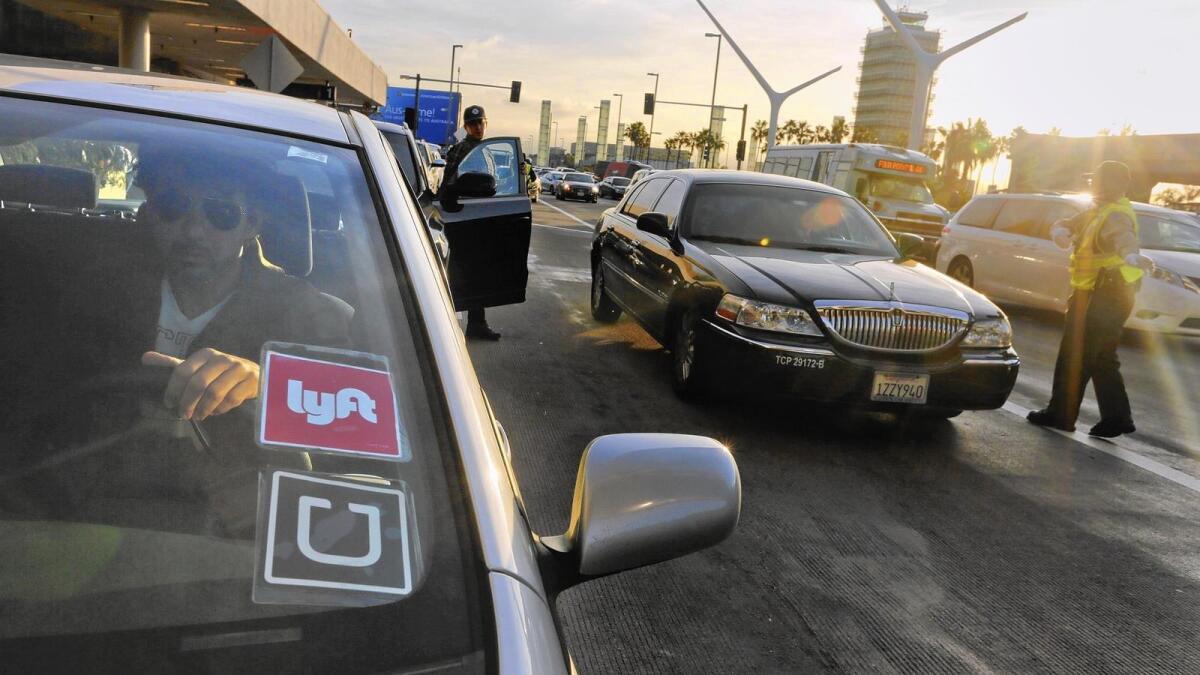
Uber, Lyft and other drivers for ride-hailing companies will face greater restrictions under new legislation signed Wednesday by Gov. Jerry Brown.
Drivers will be subject to stricter background checks and face tighter rules on driving under the influence through legislation authored by Assemblymen Jim Cooper (D-Elk Grove) and Katcho Achadjian (R-San Luis Obispo).
Under one law, ride-hailing companies no longer can hire drivers who are registered sex offenders, have been convicted of violent felonies or, within the last seven years, have a driving-under-the-influence conviction. The companies will face fines of up to $5,000 for violating the rules. The second law prohibits drivers from having a blood-alcohol level of 0.04 or higher compared to the current level of 0.08 for non-commercial drivers.
Brown also signed legislation from Assemblyman Mike Gatto (D-Glendale) making it easier for potential drivers to work for the companies. The new law allows potential drivers to rent cars to work for Uber, Lyft and the other companies.
That effort, which has been part of expansion plans for Uber and Lyft, is currently allowed, but the industry’s regulator, the California Public Utilities Commission, was weighing whether to limit it. The new law ensures the rental practices will continue.
Brown also vetoed a bill from Assemblyman Evan Low (D-Campbell) to create a statewide taxi commission in an effort to level regulations between taxis and the looser rules surrounding ride-hailing companies.
In a veto message, Brown said the state shouldn’t shoulder the responsibility of regulating the taxi industry.
“I do not believe that such a massive change is justified,” Brown wrote.
- Share via
Gov. Brown approves citizens redistricting commission for L.A. County Board of Supervisors
Despite opposition from the Los Angeles County Board of Supervisors, Gov. Jerry Brown on Wednesday approved a bill that will create a citizens redistricting commission to redraw the panel’s district lines after the next U.S. Census.
State Sen. Ricardo Lara (D-Bell Gardens) said his measure would result in a 14-member, independent, bipartisan group drawing new district maps that are fair and more representative of the county’s diversity.
“With this new law, we will ensure that the people of Los Angeles County have a greater representative voice in their county’s political process,” Lara said in a statement.
Brown took the action despite a veto request sent to him this month by Hilda L. Solis, chairwoman of the Los Angeles County Board, on behalf of the panel.
“This measure is unnecessary because Los Angeles County already has a redistricting process in place that provides fair and effective representation on the Board of Supervisors to all County residents,” Solis wrote. “The argument that SB 958 is needed has no basis because Los Angeles County is in full compliance with all Federal and State redistricting Requirements.”
The county’s plan allowed the board to appoint a redistricting committee that could recommend district maps. The new law allows the commission, whose members will be drawn in a process excluding the board, to adopt a redistricting plan without board action.
The members of the commission would be randomly selected in 2020 by the county Auditor-Controller from a pool of applicants whose eligibility will be determined by the Los Angeles County Registrar-Recorder/County Clerk.
The measure also was opposed by Alan Clayton, a redistricting consultant who has advised politicians in the past. He said by appointing members to the commission based on voter registration in the county, it would give Democrats up to 10 of the seats, allowing them to create a partisan redistricting plan,
“Once you have a significant lead in voter registration over others, you can control redistricting,” Clayton said.
Brown declined to comment on why he signed the bill.
- Share via
Statute of limitations for rape eliminated in California after Gov. Brown signs bill prompted by Cosby allegations
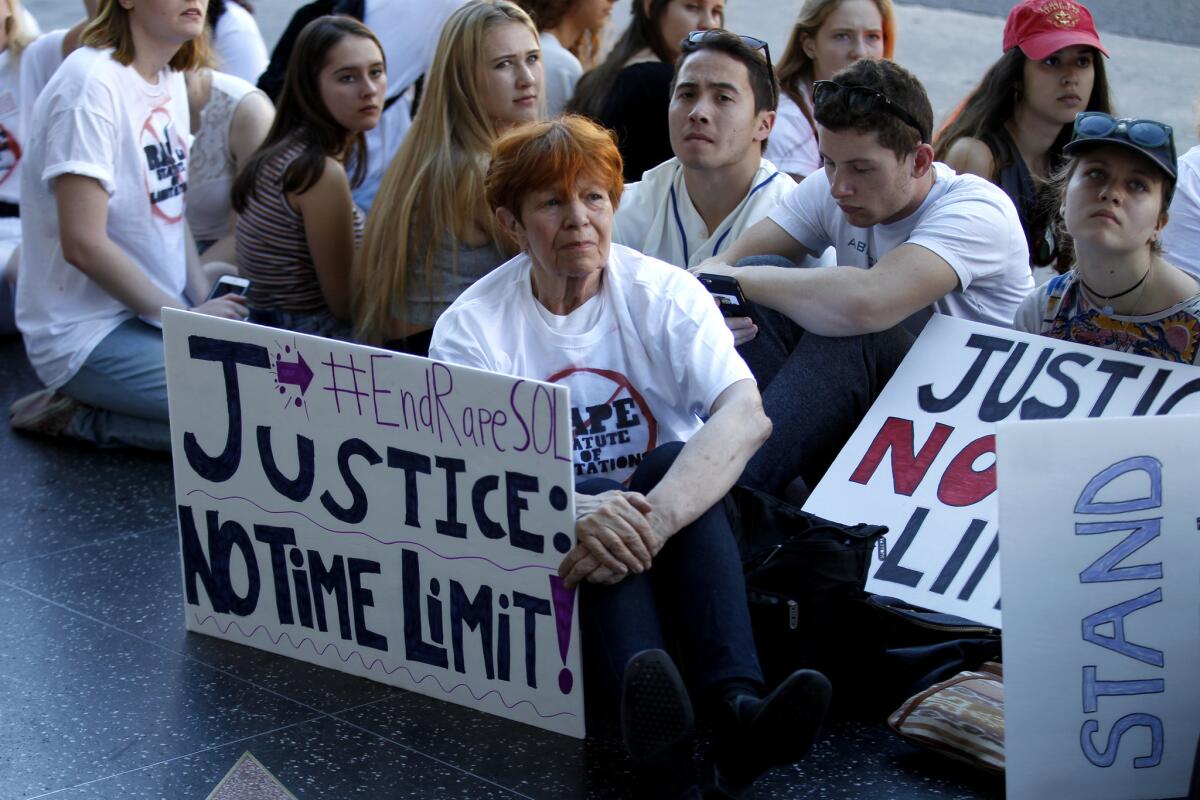
California has ended its statute of limitations for rape cases after Gov. Jerry Brown on Wednesday signed legislation filed in the wake of sexual assault allegations against comedian Bill Cosby.
Senate Bill 813, filed by State Sen. Connie Leyva (D-Chino) amends the penal code so that some sex crimes, including rape, forcible sodomy and molestation of a child, can be be prosecuted, regardless of how long ago the crime occurred.
Leyva lauded Brown’s decision, saying it told every rape and sexual assault victim in the state “that they matter.”
“It shows victims and survivors that California stands behind them, that we see rape as a serious crime, that victims can come forward and that justice now has no time limit,” she said.
The new law will affect only sex crimes that occur next year or later and offenses for which the statute of limitations has not expired by Jan. 1.
In California, the statute of limitations for rape is 10 years unless new DNA evidence emerges later. Sex crimes against minors must be prosecuted before the alleged victim turns 40.
It’s unclear how many additional prosecutions a longer deadline or the abolition of any time limit might bring. And several advocacy groups and associations argued the bill was among those that would disproportionately affect poor and minority defendants with little or no representation.
But supporters said the new law would help victims who are often reluctant to report the abuse to police until many years later. Rape and sexual assault are typically committed by someone victims know, making it difficult to speak out, lawyers and advocates said. Many victims also often experience shame, fear and extreme anxiety and don’t come forward until they have the confidence or a support system later in life.
The legislation was signed as Cosby, who has said his relationships with his accusers were consensual, is facing trial in Pennsylvania on three felony counts of aggravated indecent assault.
But Betsy Butler, executive director of the California Women’s Law Center, said advocates have been pushing for such legislation long before women spoke out against Cosby.
“It is exciting for victims, and it puts perpetrators on notice,” she said.
- Share via
Sex offenders will have to disclose email addresses, user names under new law

Sex offenders will soon have to report their email addresses, user names and other Internet identifiers to police under a bill Governor Jerry Brown signed Wednesday.
The bill, authored by state Sen. Ben Hueso (D-San Diego), will apply to people convicted on or after Jan. 1, 2017 of Internet-related sex crimes.
Law enforcement can use the information only to investigate a sex crime, kidnapping or human trafficking. Offenders will have 30 days to report new or modified addresses and usernames.
The bill amends parts of California law enacted in 2012 when voters passed Proposition 35, an anti sex-trafficking law.
Proposition 35 passed by statewide ballot with more than 80% of the vote. It increased punishments for human traffickers and expanded the definition of human trafficking to include the creation and distribution of child pornography.
In 2014, a federal court sided with a challenge to the law that argued parts of Proposition 35 violated sex offenders’ constitutional rights. The court gave California until the end of this year to fix flaws it found in the law.
“We have learned that the internet has become extremely popular for sex crimes,” Hueso said in a statement last month when the Legislature passed the bill. “We must take action to protect our children and take this growing problem very seriously.”
- Share via
More incentives for developers to build low-income housing through bill signed by Gov. Brown
- Share via
Governor vetoes bill to mandate parking after street sweeping, prevent tickets at broken meters
Gov. Jerry Brown vetoed a bill Wednesday that would have required communities to reopen parking immediately after street-sweeping.
The bill also would have prevented residents from getting ticketed if they parked next to a broken meter for up to two hours.
In his veto message Brown said the bill would have hindered municipalities from performing regular road maintenance and would have confused drivers about when they were allowed to park in certain areas.
- Share via
Felons in county jails to be allowed to vote in California elections
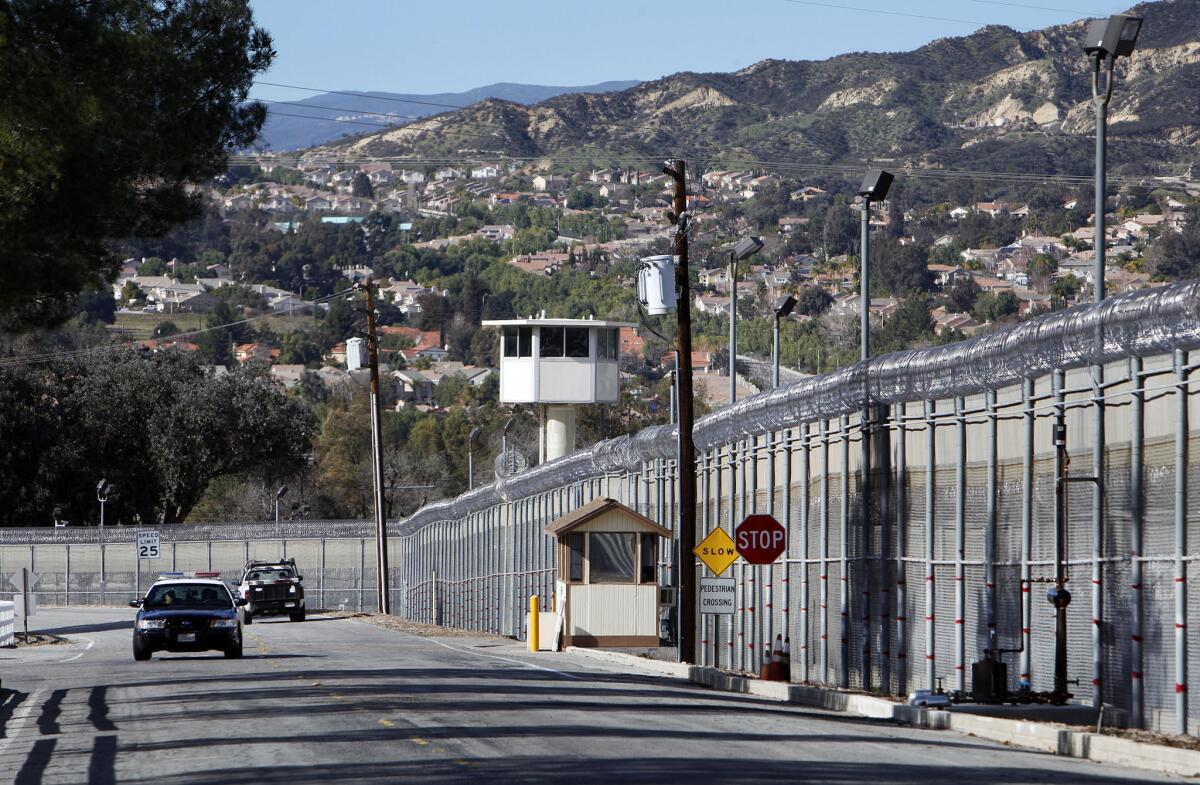
Despite widespread opposition from law enforcement, Gov. Jerry Brown on Wednesday signed a bill that will allow thousands of felons in county jails to vote in California elections as part of an effort to speed their transition back into society.
Through a representative, Brown declined to comment on the bill by Assemblywoman Shirley Weber (D-San Diego), who said it would reduce the likelihood of convicts committing new crimes.
“Civic participation can be a critical component of re-entry and has been linked to reduced recidivism,” Weber said when the bill was introduced.
On Wednesday, Weber said California is setting an example at a time when other state’s are trying to limit voting rights.
“I wrote AB 2466 because I want to send a message to the nation that California will not stand for discrimination in voting,” Weber said Wednesday after the bill was signed.
Sen. Patricia Bates (R-Laguna Niguel) criticized the approval of the legislation, which takes effect Jan. 1.
Bates said the new law will undermine the integrity of elections by allowing people in jail to decide close contest.
“It is very disappointing that felons still serving their sentences behind bars will now be able to vote since Governor Brown failed to veto this really bad bill,” Bates said in a statement.
However, the action was praised Wednesday by Daniel Zingale, senior vice president of The California Endowment, a private, statewide health foundation.
“California is stronger and healthier when more people participate in the electoral process,” he said. “Mass disenfranchisement for minor offenses is a tragic legacy of the Jim Crow era that disproportionately affects and diminishes the power of communities of color.”
The measure is opposed by the California State Sheriffs’ Assn. the California Police Chiefs Assn., which argued the state should not be restoring a right traditionally lost when people commit serious crimes until after they leave incarceration.
“We believe that there have to be consequences to your action, and the consequences of being a convicted felon are that you can’t vote and you can’t possess firearms,” said Kern County Sheriff Donny Youngblood, president of the California State Sheriffs’ Assn.
Updated at 1:45 pm to include new comments from Assemblywoman Weber, Sen. Bates and advocate Daniel Zingale.
- Share via
Smoking is still OK at California state parks and beaches after Gov. Jerry Brown vetoes a proposed ban
Gov. Jerry Brown on Wednesday vetoed a bill that would have banned smoking in California’s 270 parks and beaches, saying it was too broad and punishing.
Sen. Marty Block (D-San Diego) authored the bill with the aim of reducing the health impacts of secondhand smoke on parkgoers, cutting litter from cigarette butts and eliminating a cause of wildfires.
Those cited for violations, including disposing of the remains of cigarettes and cigars, would have faced fines of up to $250. Brown said the bill went too far.
“The complete prohibition in all parks and beaches is too broad,” he wrote in his veto message. “A more measured — and less punitive — approach might be warranted.”
The veto came a day after Brown also decided not to sign a bill that would have banned smoking on state college campuses.
However, earlier this year, Brown signed some sweeping anti-tobacco measures that included raising the smoking age from 18 to 21 and banning the use of electronic cigarettes in public places where smoking is prohibited.
- Share via
Democrat in heated House race picks up endorsement from California nurses union
Democratic lawyer Bryan Caforio nabbed endorsements from California’s powerful nurses union Wednesday and its national affiliate as he joined striking nurses on a picket line outside Antelope Valley Hospital.
Caforio is challenging freshman Rep. Steve Knight in California’s 25th Congressional District, a contested tossup race that will play a role in both parties’ hopes for control of the House.
Caforio has been consistently hitting Knight on his firm opposition to abortion.
“We find it outrageous Rep. Steve Knight would cut funding for Planned Parenthood, which allows registered nurses the opportunity to provide critical health care to millions of women and families,” John Michael De La Cerda, a registered nurse at Antelope Valley Hospital, said in a statement.
The issue could help Caforio in the increasingly swing district, which includes Antelope Valley west to Santa Clarita and Simi Valley.
The district was once solidly Republican, but Democrats now have a single percentage point lead over Republicans among registered voters. About a fifth of voters in the district have no party preference, according to the secretary of state.
- Share via
Ready to rumble? Proponents of Prop. 61 drug pricing measure challenge pharmaceutical companies to a debate
For weeks now, voters have been deluged on TV and cable networks with ads for and against Proposition 61, the November ballot measure aimed at lowering drug prices for state agencies.
On Wednesday, supporters of the measure added a full-page advertisement in the San Francisco Chronicle, challenging their opposition to a televised debate on the issue.
The ad features headshots of eight pharmaceutical company chief executives, calling them “overpaid, heartless big shots” and daring them to a televised debate on Oct. 29.
Roger Salazar, a spokesman for the Yes on 61 campaign, says his group has already purchased 30 minutes of airtime on various stations statewide, including in San Francisco, Los Angeles and Sacramento.
Michael Weinstein, president of the AIDS Healthcare Foundation, which is helping bankroll the measure, said last week he would debate the CEOs “anywhere, any time.”
“The public deserves to know who’s bankrolling the No on 61 side and what their motivations might be,” Salazar said. “We are asking them to put up the CEOs of these organizations to come out and debate the measure themselves.”
“We’ve been doing public debates with Weinstein and with others from the Yes on 61 campaign, up and down the state, for months,” said Kathy Fairbanks, spokeswoman for the No on 61 campaign.
No other California ballot measure in recent memory has been the subject of a statewide televised debate. Voters, however, support the idea: In a 2013 survey by the Public Policy Institute of California, 75% of adults — and 76% of likely voters — said they supported the idea of having proponents and opponents of ballot initiatives debate on TV.
Salazar said that if there is no debate, the time could be converted to a series of TV spots instead.
In two separate polls recently, including the USC/Los Angeles Times Dornsife poll, voters say they would vote for Proposition 61 by a 3-to-1 margin.
- Share via
Wells Fargo loses some of its state business following controversy over sales practices
- Share via
Olympic medalist featured in new ads against gun-control initiative Proposition 63
Six-time Olympic shooting medalist Kim Rhode is featured in a second wave of video ads by the campaign against Proposition 63 that argue the gun-control initiative will hurt competitive and sports shooters and women.
The three, 35-second web ads are scheduled to be posted late Wednesday by the Coalition for Civil Liberties, a campaign committee formed by the California Rifle and Pistol Assn., which is the official state affiliate of the National Rifle Assn.
The ads attack an initiative by Lt. Gov. Gavin Newsom that would require background checks and the keeping of sales records for people purchasing ammunition, outlaw ammunition magazines that hold more than 10 rounds and provide a process for taking guns away from Californians convicted of felonies.
Rhode, a Southern California native, says in one ad that she has to fire 800 rounds of ammunition each day to keep up her accuracy.
”If Gavin Newsom has his way, it’ll make it incredibly hard to keep up my skills,” said Rhode, whose bronze for skeet shooting last month in the Rio de Janeiro Olympics was her sixth medal.
She does not elaborate on how the initiative would affect her shooting, but Jaren Grenell, a spokesman for the “No on 63” campaign said the measure will inconvenience competitive shooters by requiring them to jump through bureaucratic hoops to keep their ammo supply stocked.
Proposition 63 spokesman Dan Newman said the initiative does not limit the amount of ammunition anyone can buy and exempts people from background checks for ammo purchases made at shooting and target ranges, unless they take the bullets away from the range.
All three ads say Proposition 63 takes away rights of gun owners.
“It’s a fact: Harsh gun laws like Proposition 63 are not the answer,” Rhode says in her ad. “They only hurt law-abiding people and do nothing to stop terrorists. Proposition 63 takes away the rights of tens of thousands of gun owners across California.”
The other two ads feature sport shooter Chris Cheng and Tiffany Cheuvront, a coalition member identified in the ad as a “civil liberties advocate” who says the initiative is bad for women.
“California would never put limits on women making choices for our bodies so why would we allow limits on protecting our bodies?” Cheuvront asks in one ad.
Cheng says in his ad that not all gun owners are white and straight, that there are minority and gay gun owners also.
“Proposition 63 takes away my rights and turns sports shooting into a crime,” he says.
Grenell said many sports shooters use large-capacity magazines.
- Share via
Outside spending on November’s legislative races nears the $5 million mark
Following a trend that began in the months prior to June’s statewide primary, contributions to independent committees seeking races for the Legislature have now blossomed to more than $4.8 million.
Campaign finance records compiled by the nonpartisan Target Book, which tracks legislative races, shows as few as 10 individual races attracting the lion’s share of the money raised by independent expenditure committees.
The race leading the list of independent expenditures at more than $1 million is for an open Assembly seat in the communities east of San Francisco, where two Democrats — Mae Torlakson and Concord Councilman Tim Grayson — are locked in what’s become a proxy war over state education reform.
Torlakson is the wife of state Supt. of Public Instruction Tom Torlakson.
The outside money in the race is almost equal to what Mae Torlakson and Grayson, combined, have raised in their own campaign accounts. A more complete look at spending on all legislative races will be reported by campaigns later this week.
Those committees have been allowed to raise and spend money in unlimited sums for more than 15 years, as long as they don’t coordinate their activities with the actual legislative candidates. California’s wide berth given to independent expenditures was a precursor to the explosion of similar spending in national campaigns.
In the primary season, the Target Book analysis reports more than $29 million was spent by independent committees on legislative races.
- Share via
Retiring Carmel Democrat Rep. Sam Farr hailed on House floor
Just months are left before Rep. Sam Farr (D-Carmel) heads home from Washington for the last time, and the salutes to his 23-year-long House career have begun.
On Wednesday, Rep. Earl Blumenauer (D-Ore.) spent a few moments on the House floor speaking about Farr’s accomplishments.
Reps. Lois Capps (D-Santa Barbara) and Janice Hahn (D-Los Angeles) are also leaving Congress in January, and Democratic Sen. Barbara Boxer is retiring from her post. Rep. Loretta Sanchez (D-Orange) is vacating her House seat to run for the U.S. Senate.
- Share via
Republican Justin Fareed hit with Trump-focused attack ad in Santa Barbara congressional race
Santa Barbara television viewers will see a new political attack ad courtesy of the Democratic super PAC House Majority PAC, part of a $328,000 TV blitz against Republican candidate Justin Fareed, a former Capitol Hill staffer running to replace outgoing Democratic Rep. Lois Capps.
The new ad released Wednesday is the third attack ad to hit Fareed over his support for Donald Trump and his statement during a May debate that he favored a House investigation into Planned Parenthood.
“While it’s shocking that Justin Fareed supports a candidate for president who has made so many offensive statements about women and who actually believes in punishing women who exercise their right to choose, it’s also entirely unsurprising,” said House Majority PAC Executive Director Alixandria Lapp in a statement.
The ad is similar to one released Tuesday by Fareed’s Democratic opponent, Santa Barbara County Supervisor Salud Carbajal, that highlighted Fareed’s opposition to federal funding for abortion services.
Asked by the Santa Barbara Independent if he supported efforts to halt federal funding for Planned Parenthood, a campaign representative said Fareed “does not believe that abortions through Planned Parenthood should be funded at the federal level.”
“Desperate times call for desperate measures. While Justin Fareed discusses important issues to the Central Coast like our water crisis, Carbajal pulls out lies and dirty tricks from the worn-out playbook of career politicians,” Fareed campaign manager Christiana Purves said in a statement.
Fareed’s campaign took issue with the claims made in ads by both Carbajal and the super PAC that he supports letting “insurance companies charge women more” for healthcare.
The claim, made in all three ads, cites a February interview with a Central Coast TV station in which Fareed said he supported repealing the Affordable Care Act.
Fareed does support repealing President Obama’s signature piece of legislation and, his campaign points out, replacing it with “market driven solutions” that “protect patients with pre-existing conditions.”
The contest is among the most expensive House races in the country thanks to these ads. Democrats have a six-point voter registration advantage in the district.
- Share via
Local paper endorses Nanette Barragán over state Sen. Isadore Hall in South Bay congressional race
The Daily Breeze, the newspaper that covers the South Bay cities of Los Angeles County, endorsed former Hermosa Beach City Councilwoman Nanette Barragán over state Sen. Isadore Hall III (D-Compton) for Congress in a editorial Tuesday.
Both are Democrats vying to replace Rep. Janice Hahn (D-Los Angeles), who is running for a seat on the Los Angeles County Board of Supervisors.
The editorial said that although “neither candidate is without faults,” Barragán “strikes us as a principled candidate with a consistent agenda.”
The primary campaign took on a harsh tone with Barragán hitting Hall for his ties with special interests in the oil, alcohol and tobacco industries.
Hall, who served on the Compton school board and City Council before moving to the statehouse, is backed by Gov. Jerry Brown, Lt. Gov. Gavin Newsom and former Los Angeles Mayor Antonio Villaraigosa.
- Share via
Employers in California can no longer ask about juvenile crimes
- Share via
No more mandatory minimum sentences for some prostitution crimes in California
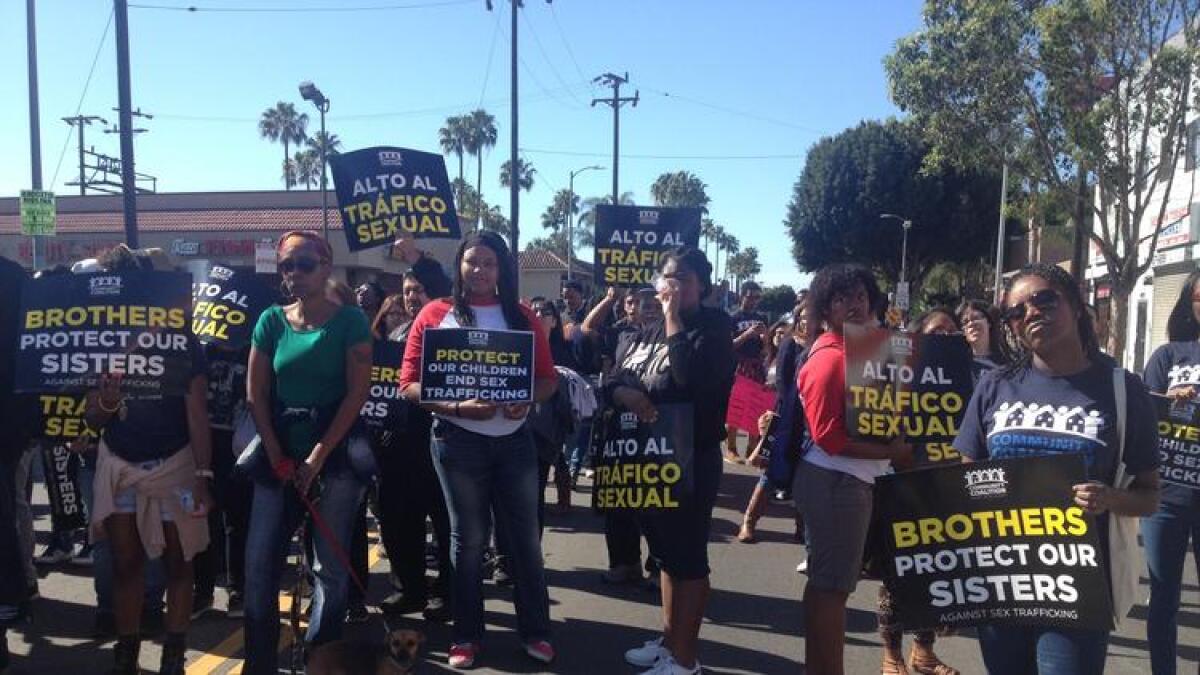
Gov. Jerry Brown on Tuesday signed legislation that repeals mandatory minimum sentences for certain prostitution crimes, continuing a bold push to help victims forced into the sex trade.
But Brown, who has been vocal against tough-on-crime policies, rejected other bills that increased consequences for sex buyers, saying current laws are sufficient.
Among the bills he signed was Senate Bill 1129 by Bill Monning (D-Carmel), which allows judges the discretion to impose appropriate sentences for engaging in or soliciting prostitution.
He also approved SB 420 by Senate Minority Leader Robert Huff (R-San Dimas), which recasts the crime of prostitution so the statute differentiates between people getting paid for sex, and the people who are paying for it.
By redefining the statute, supporters said, authorities will be able to eventually minimize repercussions for victims and increase them for sex buyers.
But for now, Brown rejected lawmakers’ efforts to increase consequences for buyers, vetoing a bill by Assemblywoman Susan Talamantes Eggman (D-Stockton) that would allow authorities to impound a vehicle used by buyers to solicit prostitution.
He also turned down a bill similar to Huff’s, which was authored by Assemblywoman Lorena Gonzalez (D-San Diego) and tried to go further by imposing a minimum period in county jail for solicitation by buyers.
“I believe the existing law provides sufficient flexibility in punishing these crimes appropriately based on circumstance,” Brown said in a signing message.
- Share via
‘Doctor shopping’ targeted in new law signed by Gov. Brown to curb epidemic of opioid overdose deaths
Faced with a spike in opioid overdose deaths, Gov. Jerry Brown on Tuesday signed legislation requiring all prescribers to check a state database to see whether their patients have also received drugs from other physicians.
Sen. Ricardo Lara (D-Bell Gardens) said patients will be prevented from doctor shopping to get excessive numbers of painkiller pills if prescribers first must check the state’s Controlled Substance Utilization Review and Evaluation System, or CURES, database.
“Overdoses claim tens of thousands of lives each year and more than half of those are attributed to abuse of opioid and prescription drugs,” Lara said in a statement. “With the governor’s signature, we will help prevent doctor shopping and work to curtail untimely deaths caused by drug abuse.”
Opioid overdose deaths have increased by 200% since 2000, according to state officials.
The new law requires physicians to check the database when providing Schedule II, III, and IV drugs.
California was the first of 49 states that currently have prescription drug monitoring programs, but a small percentage of physicians use the database here, according to Bob Pack, a leading advocate for the new law.
“Too many doctors for too long refused to use this lifesaving tool,” said Pack, who lost two children in 2003 when they were hit and killed by a driver under the influence of prescription drugs and alcohol.
- Share via
Gov. Jerry Brown vetoes bill banning racial profiling in stores, saying it’s already illegal under state law
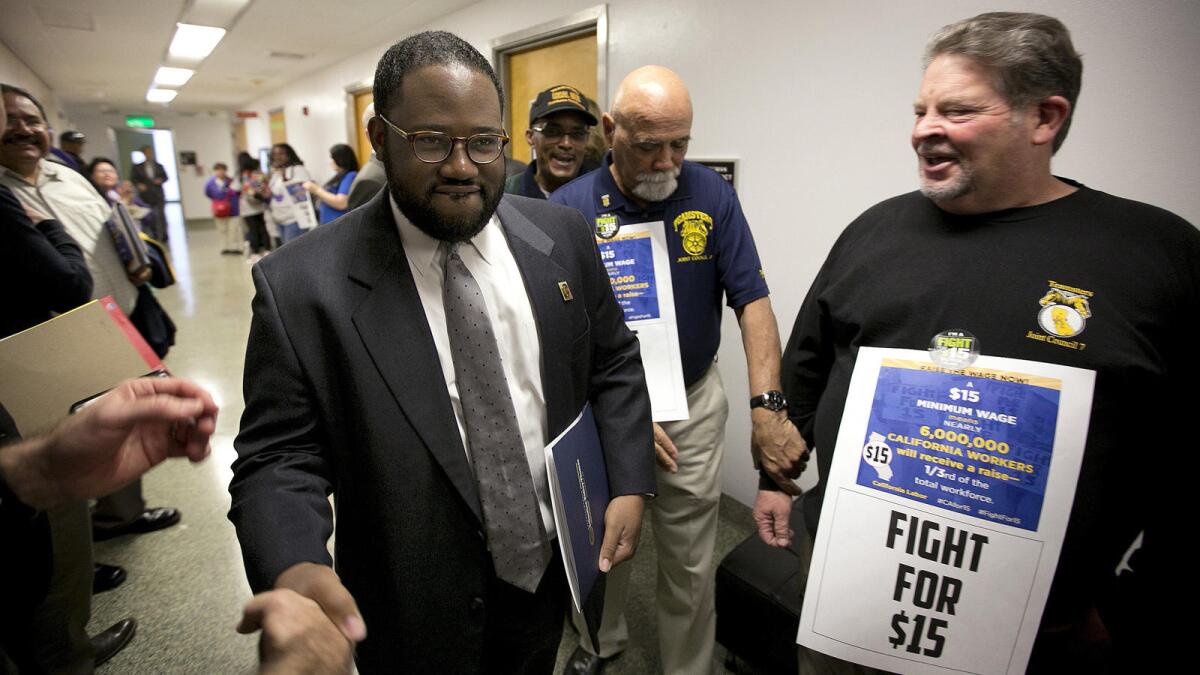
Gov. Jerry Brown has vetoed a bill that would have specifically banned racial profiling of customers in businesses, saying California law already prohibits it.
In California, discrimination based on race or ethnicity is illegal.
The bill by Assemblyman Sebastian Ridley-Thomas (D-Los Angeles) would have added language to existing laws specifically banning racial profiling of customers by California businesses.
The legislation was meant to prohibit businesses from targeting black customers as potential shoplifters because of their race.
“The Unruh Civil Rights Act — in a more expansive way — already prohibits the racial discrimination covered by this bill,” Brown wrote in a message accompanying his Tuesday veto. “Moreover, the state has vested in the Department of Fair Employment and Housing a full range of strong enforcement authority, including for those claims dealing with racial profiling.”
- Share via
Gov. Brown rejects plan to require family visits for jail inmates
An effort to ban video-only visitation between inmates and families in county jails was rejected Tuesday by Gov. Jerry Brown, who vowed instead to work on options that allow flexibility for local law enforcement needs.
Senate Bill 1157 would have required space be made available for family members to visit jailed relatives in person, an option that’s not available in as many as 11 California counties. Those counties have instead moved to video visitation.
Sen. Holly Mitchell (D-Los Angeles), the bill’s author, said last month during floor debate that those families must pay to connect with inmates using a closed, fee-based video system.
In his veto message, Brown said that SB 1157 required a “strict” mandate that he could not support. But the governor agreed that inmates could benefit from in-person visits, and that state officials will embark on a new effort at solutions in those counties.
The governor wrote that banning in-person jail visits “could have an adverse impact on achieving rehabilitative goals and might affect in a negative way the families and loved ones of those incarcerated.”
- Share via
More ‘granny flats’ are coming after governor signs two bills to ease housing shortage
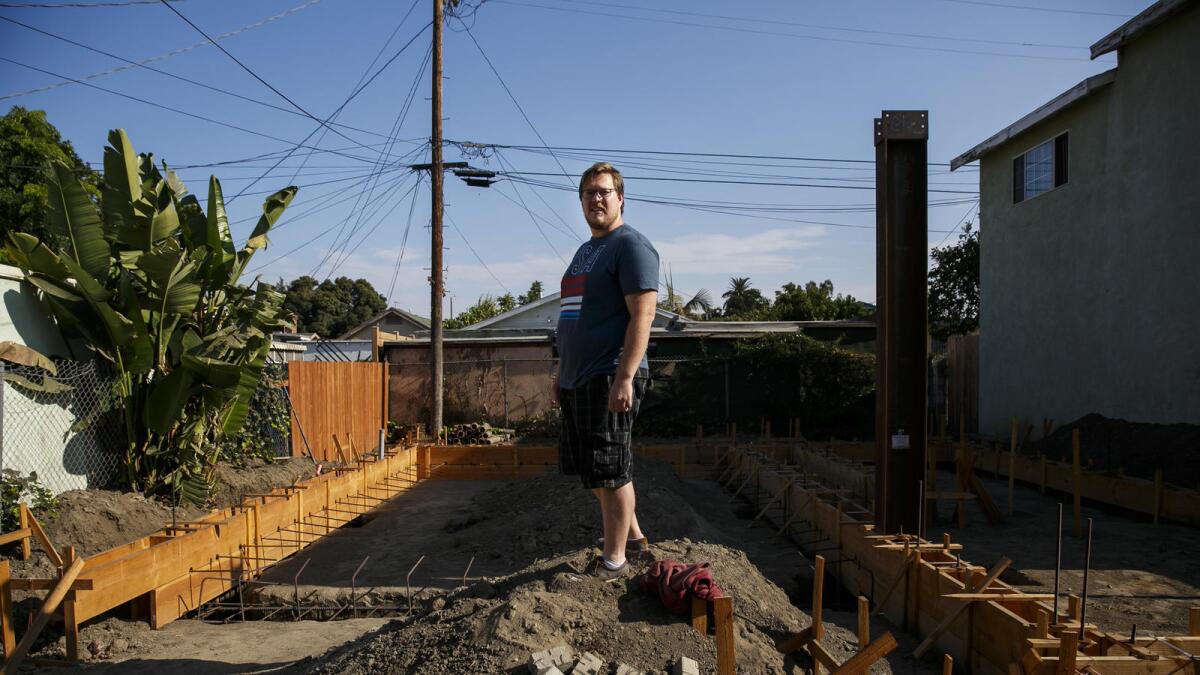
It will be easier for California homeowners to build additional small units on their properties whether in their garages or as freestanding second structures under legislation signed Tuesday by Gov. Jerry Brown.
The two bills, from Sen. Bob Wieckowski (D-Fremont) and Assemblyman Richard Bloom (D-Santa Monica), are designed to ease the state’s affordability crisis by increasing the housing supply. The measures eliminate cities’ ability to require additional parking spaces for units near public transit and limit fees charged to connect to local water and sewer systems among other efforts to make it cheaper and easier to build the secondary units, also known as granny flats.
“Removing the most egregious obstacles to building these units will help to increase the supply of affordable housing in California and allow more people to remain in the communities they call home,” Wieckowski said in a release.
Granny flats have become a political issue in cities across the state for residents opposed concerned that they conflict with neighborhood character.
In Los Angeles, the units have been in legal limbo since earlier this year when a court ruling found the city was permitting granny flats under state rules despite never repealing its more restrictive city ordinance. Last month, the City Council voted to grandfather in secondary units that were already approved and in the pipeline before the court ruling, but also voted to write new rules to take into account the distinct needs of different neighborhoods.
If a fraction of homeowners in both Los Angeles and the Bay Area decide to build granny flats, it could make a dent in both regions’ housing shortages, experts have said.
This week, the Obama administration also favorably cited granny flats as a way to ease housing prices across the country.
- Share via
Californians with terminal diseases are now cleared to try experimental drugs
Experimental drugs that do not yet have full federal approval for clinical trials could be made available to terminally ill Californians under a law signed Tuesday by Gov. Jerry Brown.
Assembly Bill 1668 clears the way for those drugs to be used for life-threatening diseases for patients who have been unable to gain access to a clinical trial and who have the approval a supervising doctor.
“Terminally ill patients in our state will finally have access to potentially life-saving treatments,” said Asemblyman Ian Calderon (D-Whittier) in a statement.
This was Calderon’s second attempt to persuade the governor to approve the so-called right-to-try legislation. Brown vetoed an almost identical effort in 2015, suggesting more time was needed to assess new efforts to speed up the federal drug approval process.
Although some patients are already able to get waivers from the federal Food and Drug Administration to try non-approved experimental drugs, the process has been called cumbersome and the waiver sometimes comes too late.
Calderon testified last week before a U.S. Senate committee in favor of experimental drug access. California becomes the 32nd state to enact right-to-try legislation.
- Share via
Gov. Brown signs bus safety bills after series of accidents

Two years after a charter bus crash killed 10 people, including five Los Angeles-area high school students, Gov. Jerry Brown on Tuesday signed legislation that will improve safety regulations for such large vehicles.
Brown signed a bill that requires charter buses designed to carry 39 or more passengers and made after July 1, 2020. to be equipped with emergency lighting that would be automatically activated in the event of a collision.
-------------
For the record
2:50 p.m.: An earlier version of this post misstated the number of students killed in a 2014 bus crash in Orland as eight. Five students died, along with three chaperons and the two drivers.
-------------
The measure also requires bus drivers to provide written or video instructions to all passengers on how to use the vehicle’s safety equipment and emergency exits prior to any trip.
Sen. Ricardo Lara (D-Bell Gardens) introduced the bill in response to a 2014 accident in which a tractor trailer drifted across the median of Interstate 5 near Orland and struck a charter bus carrying students on a trip to visit a Northern California college. Five students, three chaperons and the two drivers died.
“By making common-sense updates to bus safety practices and laws, we will save lives,” Lara said Tuesday in a statement. “We cannot stop accidents from happening, but we can help reduce tragedy and with the governor’s signature, that’s what we’ll do.”
Brown signed a separate bus safety bill in response to an accident last November in which 19 people were injured when a City Sightseeing bus crashed into construction scaffolding in San Francisco’s Union Square.
That law by Assemblyman Phil Ting (D-San Francisco) requires the California Highway Patrol to develop protocols for working with cities and counties to increase the number of tour bus inspections within their jurisdictions.
Yet another tragedy is behind a third bill signed Tuesday by Brown. Last year, a 19-year-old special needs student died in Whittier after being left in a sweltering school bus parked with its windows closed at the end of the driver’s route.
Sen. Tony Mendoza (D-Artesia) drafted the measure that requires school buses, youth buses and child care motor vehicles to be equipped by the 2018-19 school year with alert systems that will require drivers to manually disarm or scan an alarm at the rear of the bus before exiting the bus.
The new law also requires school districts to improve the training of drivers to avoid students being left on buses alone and requires notification of the Department of Motor Vehicles about some incidents involving students being left behind.
- Share via
California bans government travel to states believed to discriminate against LGBT people
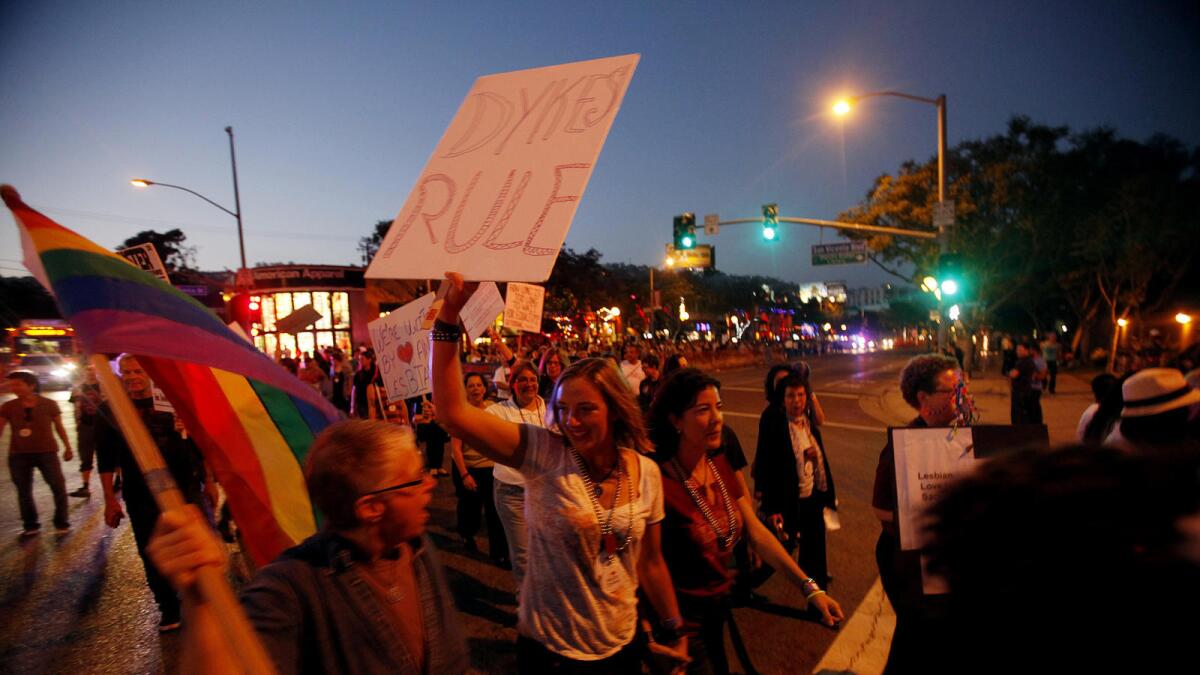
California no longer will be able to fund or require public employees to travel to states believed to discriminate against LGBT people under a bill Gov. Jerry Brown signed Tuesday.
The new law will apply to states that have passed laws after June 26, 2015, that allow “discrimination against same-sex couples or their families or on the basis of sexual orientation, gender identity, or gender expression.”
The California attorney general will create and publish a list of those states.
State agencies, the Legislature and public California universities will be subject to the new law.
The law exempts trips required for certain purposes, including to enforce California law and to meet contractual obligations made before Jan. 1.
- Share via
California outlaws ransomware, but some say catching overseas criminals will be the challenge
Gov. Jerry Brown on Tuesday signed legislation making the use of ransomware a crime in California, following increasing cyberattacks on hospitals, schools and law enforcement agencies across the state and nationwide.
The bill, authored by state Sen. Bob Hertzberg (D-Van Nuys), updates the state’s penal code, making it a felony to knowingly employ malware or intrusive software that is injected into a computer or network and allows a hacker to hold data hostage until money is paid.
Proponents say the new law will help counter attacks difficult to prosecute under existing statutes that are not tailored to combat computer crime. But some question just who will get caught in the dragnet, as the incidents are tough to trace and culprits are often overseas.
- Share via
Democrat Bryan Caforio gets endorsement from outgoing U.S. Sen. Barbara Boxer
- Share via
Rep. Loretta Sanchez missed more roll call votes this month than any other House member running for a new office
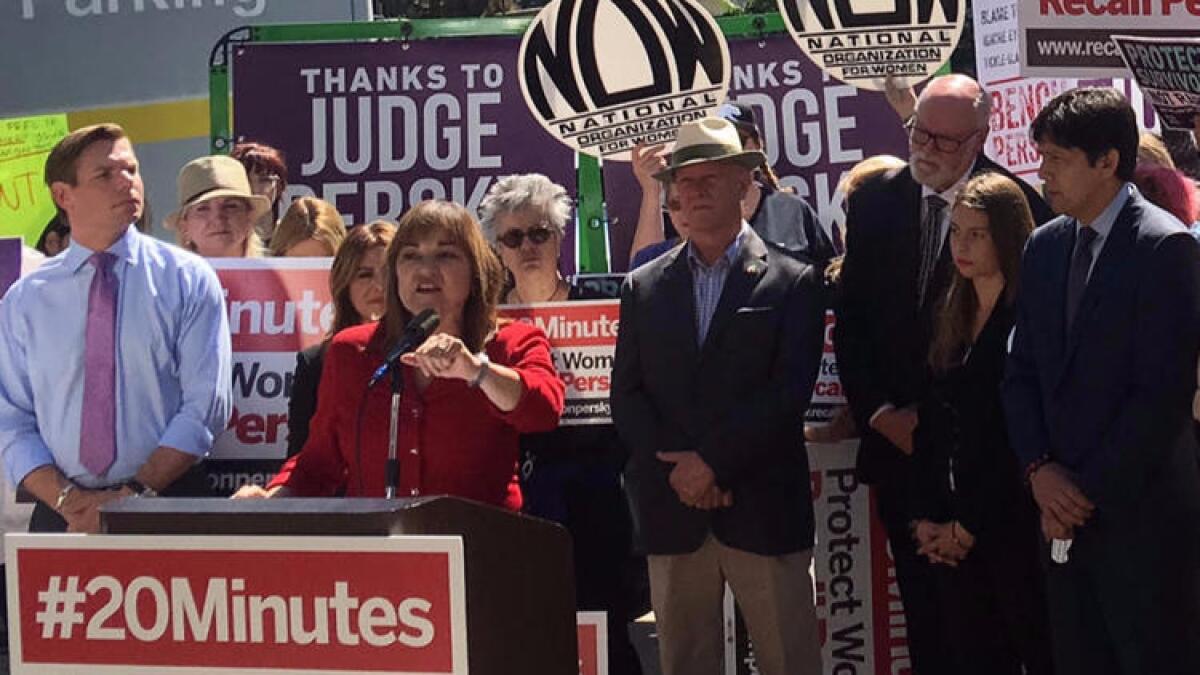
Orange County Rep. Loretta Sanchez, locked in an uphill battle in California’s U.S. Senate race, has missed almost two-thirds of House roll call votes in September, according to a report by CQ Roll Call.
Sanchez missed 41 of 63 roll calls, the most of any member of the House who is running for a different office. Many of the missed votes have been on generally noncontroversial suspension bills, CQ Roll Call reported.
-------------
For the record
1:52 p.m.: An earlier version of this post misstated the number of roll call votes Rep. Loretta Sanchez missed in September as 22. She missed 41 of 63 votes.
-------------
Sanchez launched her Senate campaign in May 2015 and faces off against fellow Democrat state Atty. Gen. Kamala Harris in the November election. Harris jumped into the race in January 2015, shortly after four-term Sen. Barbara Boxer announced her retirement.
Sanchez campaign spokesman Luis Vizcaino said the congresswoman has spent most of September campaigning across California to tell voters about the “stark difference between her work and her opponent’s record” and to highlight her expertise on national security and homeland security issues.
“It’s no secret that Rep. Sanchez is running for the U.S. Senate and it’s ironic that the same media that report she’s not campaigning enough, now say she’s campaigning too much,” Vizcaino said. “Rep. Sanchez will be in D.C. later this week for the critical budget vote and voters can trust that she will be there for them as U.S. senator.”
- Share via
Concord Democratic Rep. Mark DeSaulnier bought a condo on Capitol Hill
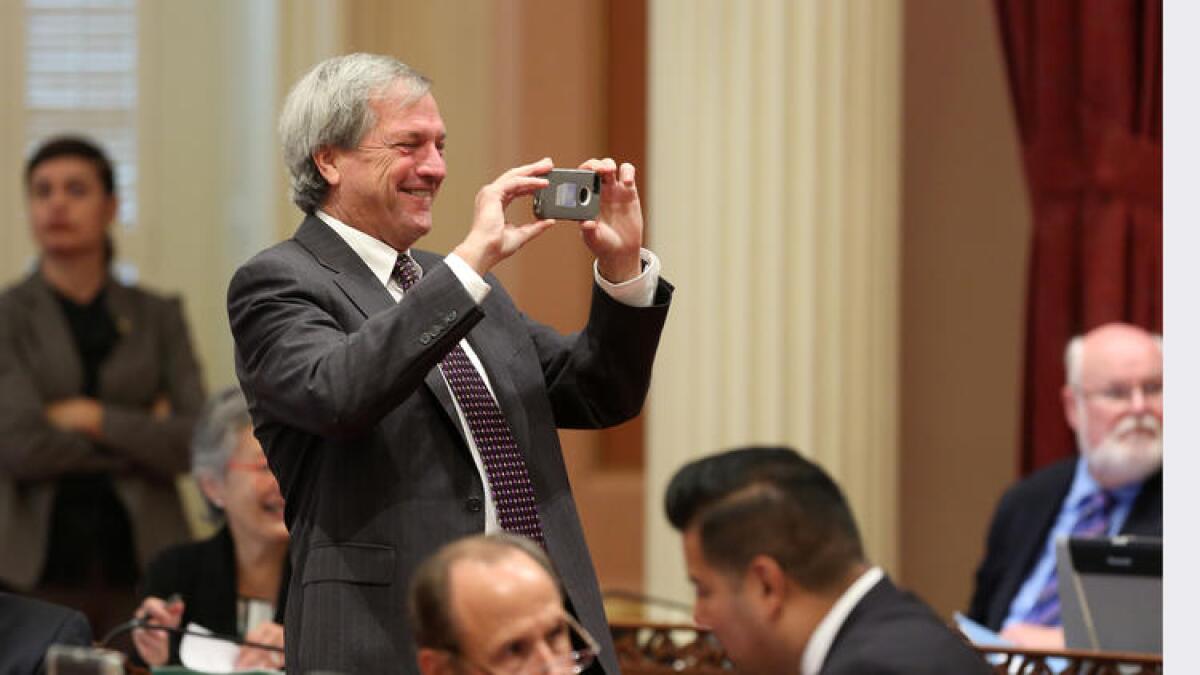
Freshman Rep. Mark DeSaulnier (D-Concord) bought a studio condo on Capitol Hill this month for $252,000, Politico reported Tuesday.
DeSaulnier announced in May that he had completed chemotherapy for an incurable form of leukemia and would seek a second term.
DeSaulnier has been sharing an apartment with Rep. Jared Huffman (D-San Rafael). The new condo is within walking distance of the Capitol.
Rent in Washington rivals Los Angeles and New York, and many members of the California delegation own homes in and around Washington.
Some examples: Rep. Xavier Becerra (D-Los Angeles) bought a home in Chevy Chase, Md., in 2009, and Rep. Jeff Denham (R-Turlock) bought a condo in downtown Washington in 2015, according to their financial disclosures.
- Share via
‘Veto Gunmageddon’ group fails to qualify ballot measures to repeal new gun control laws

Three days before the deadline, the head of a referendum drive aimed at overturning six new gun control laws announced Tuesday it will fall far short of collecting enough signatures to qualify the measures for the ballot.
San Diego-area businessman Barry Bahrami, who organized the drive, said apathy among California gun owners and difficult requirements for qualifying referenda are partly to blame for the shortfall.
“It is with disappointment that I must now report to you it appears we will not obtain the minimum signatures required to get these referenda on the ballot,” Bahrami wrote on his Facebook page in a note addressed to “Patriots.”
He said those involved in the campaign now will turn their attention to working towards drafting a possible initiative for the 2018 ballot to protect gun owners rights
His group, “Veto Gunmageddon,” needs to turn in 365,000 signatures on each of the six referenda by Thursday, but his campaign has less than one third of the signatures needed, according to initial tallies posted by the group on Facebook.
The most signatures in hand, 115,141, are for the referendum to overturn SB 880, which bans the sale of semi-automatic rifles with detachable magazines.
“We did not get the signatures because of the way the bills were passed and signed,” Bahrami said in an email Tuesday. “Most gun owners still do not know a gunmageddon happened.”
Although gun shops and shooting ranges agreed to have petitions on hand to sign, Bahrami said there was not enough interest even by gun owners.
“Apathy among California gun owners was clearly a factor, too,” he said.
Despite the setback, Bahrami said he hopes the gun community has begun organizing better.
“The referenda drive brought many gun owners together,” he said. “It was just a start.”
Bahrami’s group reported on its website Tuesday that it had just 112,241 signatures on a referendum to overturn SB 1235, a new law that, beginning January 1, 2019, would require anyone buying ammunition in California to have their name checked against a database of those not eligible to possess firearms. All of the other referenda petitions had fewer signatures.
Bahrami, CEO of Commercial Network Services, got a late start on the referenda drive, so he only had two of the three months normally allotted for collecting signatures. If the referenda had qualified, they would have suspended the new laws until voters acted on each ballot measure.
“Only law abiding citizens will respect these laws, which of course will result in only criminals retaining these soon to be illegal firearms and their magazines,” Bahrami wrote on his Facebook page.
- Share via
Pair of attack ads in House race hits Democrat for tax liens, Republican for backing Donald Trump
The hits keep coming and the money keeps flowing in the expensive race to replace outgoing Rep. Lois Capps (D-Santa Barbara), and the attacks are getting personal.
Two weeks ago it was the Democratic Super PAC House Majority PAC that launched an $328,000 TV attack on Republican candidate Justin Fareed, a 28-year-old former Capitol Hill staffer, comparing him to Republican presidential nominee Donald Trump.
It was the National Republican Congressional Committee’s turn Tuesday, and the group hit back with the first ad in a $668,750 broadcast buy that will run until election day.
The ad skewers Democratic Santa Barbara County Supervisor Salud Carbajal for voting for tax increases while in office and points out he had three federal tax liens placed against him.
The three liens came between 1994 and 1996 and totaled $10,916, according to public records. They were paid off in 2000.
“While he doesn’t hesitate to raise taxes on everyone else, Carbajal got caught not paying his fair share,” said NRCC spokesman Zach Hunter in a statement. “Salud Carbajal is a champion for himself, not Central Coast families.”
The matter came up in February during the primary, and Carbajal told the Santa Barbara Independent then, “Like many families, there was a time I fell behind on paying my bills. ... However, my taxes have been paid in full, and I continue be current on all of my financial obligations.”
Carbajal’s campaign was expecting the ad and had its own attack prepared for Fareed.
The spot continues the Democrat’s attempt to tie Fareed to Trump in a district where Democrats have a six-point voter registration advantage.
The ad highlight’s Fareed’s endorsement of Trump as well as his stance as an opponent of abortion and his position that Planned Parenthood should not use federal funds for abortion procedures.
“Justin Fareed claims to be the fresh candidate in this congressional race, but his dangerous ideas are the same old right-wing politics of the past,” the campaign said in a statement.
Times researcher Scott Wilson contributed to this report
- Share via
This Democrat’s legal past both helps and haunts him in California’s most competitive congressional race
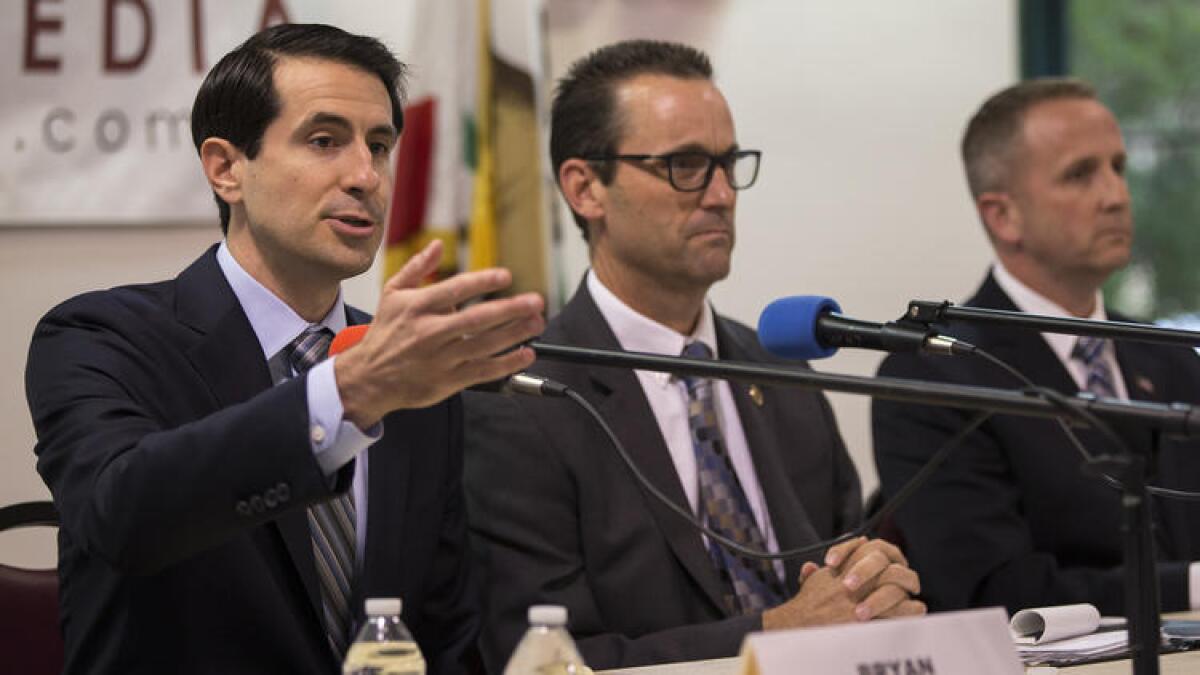
When first-time candidate Bryan Caforio explains how he got into politics, he points out that it was his experience as a lawyer that fueled his decision last winter to jump into a heated Los Angeles County congressional race.
Caforio, 33, whom Democrats have identified as their best chance to oust one of the state’s Republicans, says that as a trial lawyer, he “saw a system in which far too many people in our community were taken advantage of on an almost daily basis” because “corporate politicians” were “looking out for the biggest banks and the wealthiest corporations instead of the people back here at home.”
The comments came in a recently released campaign video called “My Story” that shows Caforio talking to a worker in a welding mask. The candidate then explains how his wife, Lisa, told him that “instead of doing this one case at a time, instead of doing it one client at a time,” he ought to run for Congress to “build a better system” and “an economy that works for everyone and not just the wealthy few.”
But an examination of Caforio’s six-year tenure at the Century City firm Susman Godfrey suggests his work more often involved being called upon by large corporations and multimillionaires from around the globe in times of legal need.
- Share via
Election day registration comes to California in 2017 as long-awaited voter database gets certified
Californians will be able to register to vote on election day starting next year after the state’s new voter database was officially certified for use on Monday.
The certification of the VoteCal statewide database by Secretary of State Alex Padilla came almost seven months after the technical work was completed, and more than 15 years after a federal law mandated its creation.
“Connecting all 58 counties through VoteCal will help elections officials throughout the state accurately and efficiently maintain voter rolls,” Secretary of State Alex Padilla said in a written statement.
The traditional system relied on individual counties maintaining their own lists of registered voters. The new database promises to make additions, deletions or changes to a county’s list instantly retrievable in other parts of the state.
Same-day registration will not be available for the Nov. 8 election, but will be allowed in local elections next year and in statewide elections beginning in 2018.
VoteCal will also allow voters to check their ballot’s status to see if it was properly counted. And it will allow for implementation of a new law that allows Californians as young as 16 and 17 to “pre-register” to vote, with their voter applications turned active once they are 18.
The system is also the building block to a sweeping election law that would move more Californians to voting by mail, a proposal passed by the Legislature last month and now on Gov. Jerry Brown’s desk.
- Share via
Californians will soon pay a new car battery fee to help cover cleanup from the Exide battery plant
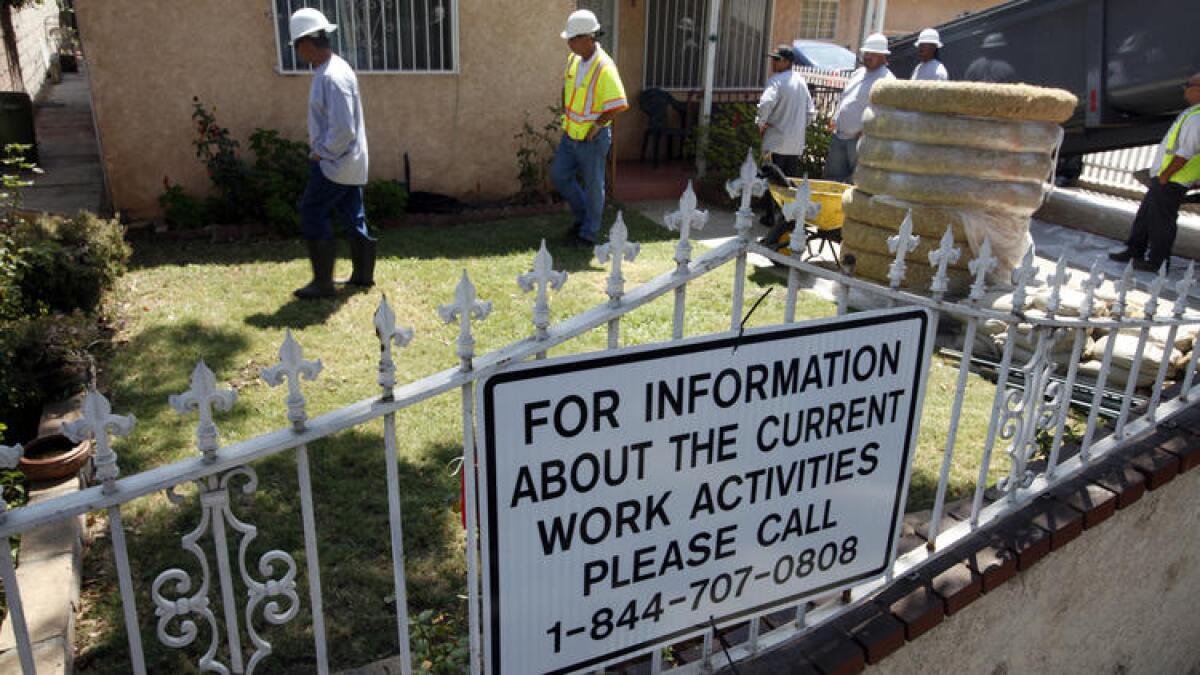
Californians will pay a new $1 fee on lead-acid car batteries under a law signed by Gov. Jerry Brown on Monday, with a portion of the proceeds going to the massive toxic cleanup in communities near the former Exide battery plant in Los Angeles County.
Brown’s signature on Assembly Bill 2153 came after a bipartisan vote in the Legislature last month and private negotiations with the bill’s author, Assemblywoman Cristina Garcia (D-Bell Gardens).
The new fee for consumers will begin in April, and will rise to $2 a battery after five years. Prior to that, the cost is being split between purchasers and battery manufacturers.
Regulators believe as many as 10,000 homes may have been contaminated in the vicinity of the former Vernon battery recycling plant, a cleanup that could ultimately cost hundreds of millions of dollars.
“Decades of improper lead-acid battery recycling have left these communities to face enormous environmental challenges,” said Brown in an unusual statement issued with his signing of the bill.
The new battery fee is expected to generate $24 million a year and will ultimately be available to cleanup projects across the state other than the Exide effort.
In his signing message, Brown emphasized that the solution inspired by the events outside Los Angeles is not one that necessarily applies to other needs.
“This approach is a departure from how the state enforces environmental law,” the governor wrote. “This model should be the exception, not the rule.”
The new law doesn’t limit the ability of state regulators to go after the battery industry for cleanup costs, but any company required to pay those costs will receive credit for what it pays into the fund for the first five years.
- Share via
Governor expands hands-free driving laws in California

Gov. Jerry Brown signed a bill Monday to expand laws that ban people from calling and texting while driving unless they have hands-free devices.
Californians will soon face broader restrictions on using their smartphones while driving.
Gov. Jerry Brown signed a bill Monday to expand existing laws that ban people from calling and texting while driving on California roads unless they have hands-free devices.
The first restrictions on cellphone use while driving in California were passed in 2006, when mobile devices were much less sophisticated than modern smartphones.
The legislation signed Monday broadens the laws to encompass other distracting activities drivers can perform on their phones, said Assemblyman Bill Quirk (D-Hayward), the bill’s author.
It will explicitly prohibit people from using a mobile phone while driving unless the device is in a hands-free mode. In addition to texting and calling, the new law aims to prohibit other cellphone uses while driving, such as taking photos or streaming video.
- Share via
Kamala Harris, Anthony Rendon and Betty Yee will take to Twitter for a debate play-by-play tonight
During tonight’s presidential debate, the California Democratic Party is turning over the keys to its Twitter account to state Atty. Gen. Kamala Harris, state Controller Betty Yee and Assembly Speaker Anthony Rendon for a lively, play-by-play tweetfest. It’s a safe bet that they’ll be in Hillary Clinton’s corner.
- Share via
An alternative energy subsidy just ended its quirky legislative trip with an approval from Gov. Jerry Brown
The long, winding journey of a proposal to boost fuel cells — an alternative energy source that promises cleaner electricity — culminated Monday with Gov. Jerry Brown signing a bill to extend a vital subsidy to the industry.
The final approval of AB 1637 by Assemblyman Evan Low (D-Campbell) marks the end of one of the messier exercises in Capitol sausage-making this year, with some observers pointedly noting that the main benefactor was Bloom Energy, a politically connected Silicon Valley firm.
Bloom and its allies argue the saga was a hard-fought slog against powerful adversaries including utilities and labor groups.
But rival companies and some lawmakers said Bloom owes its success to the eager backing of California’s top politicians and upending the public legislative process, affording it chances most other groups don’t get.
- Share via
Public college students can still light up on campus after Gov. Brown vetoes smoking ban bill
Gov. Jerry Brown on Monday vetoed a bill that would have banned smoking and use of electronic cigarettes on state university and community college campuses, saying the measure was not necessary.
“The governing boards of our public colleges and universities already have the authority and are fully capable of setting smoking policies on their campuses,” Brown wrote in a veto message on AB 1594.
The bill by Assemblyman Kevin McCarty (D-Sacramento) would have banned smoking and vaping on California State University and California Community Colleges system campuses beginning in 2018.
The University of California system has had a policy in place for years. About 18 of the 72 community college districts, with 37 campuses, already have smoke-free policies, as does Cal State Fullerton. The Cal State system is in the process of adopting a systemwide smoke-free policy and hopes to have it in place soon.
McCarty said his bill was introduced to “ease the problem of second-hand smoke for the non-smoking community at all public higher education institutions.”
Brown’s veto came just months after he signed bills raising the smoking age from 18 to 21, banning the use of electronic-cigarettes in public places where smoking is prohibited and eliminating exceptions allowing people to light up in certain areas at public school facilities.
- Share via
‘You live in some fantasy land’: Lt. Gov. Gavin Newsom receives flood of criticism on gun and marijuana initiatives
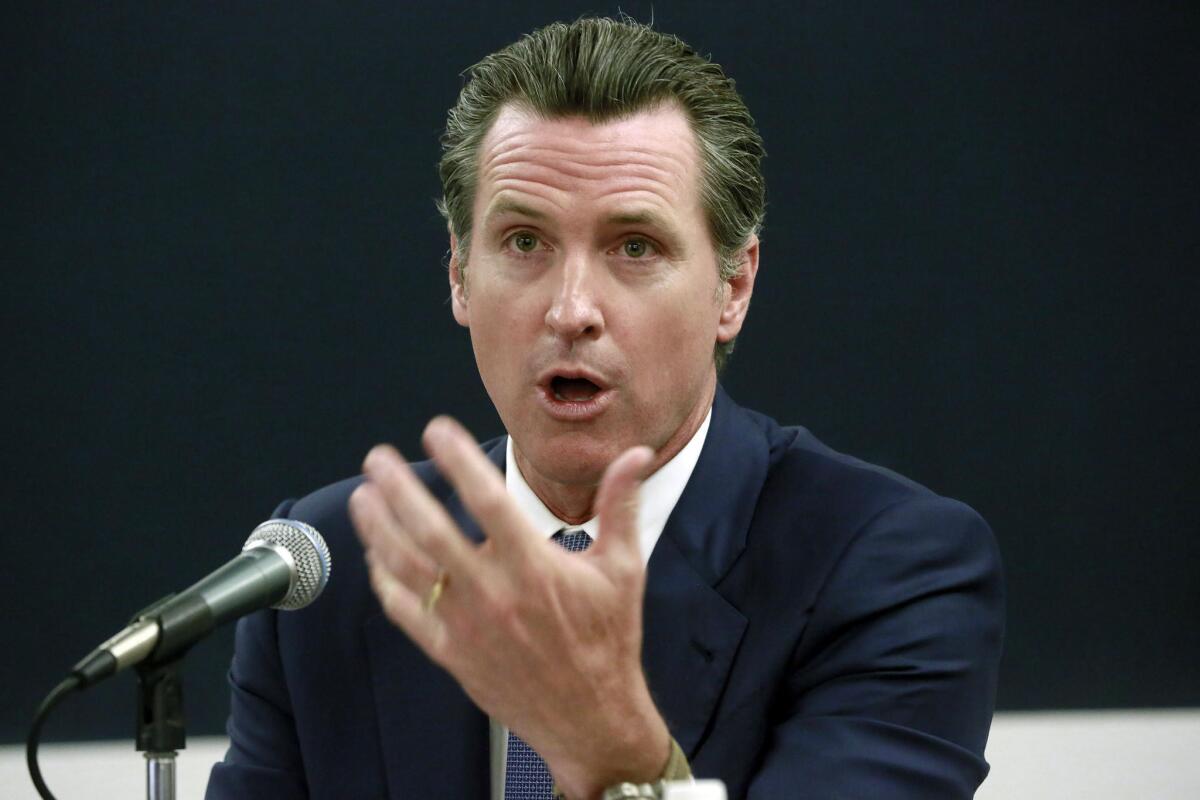
Lt. Gov. Gavin Newsom on Monday received a flood of critical remarks from gun owners and others when he opened up a live Q&A session on Facebook in which he invited questions on his gun control measure, Proposition 63, and his initiative to legalize recreational use of marijuana, Proposition 64.
The staff read questions submitted to Newsom, but ignored the most critical comments left on his Facebook page. Instead, Newsom was asked what he hopes the initiatives will achieve and how they would affect Californians.
Newsom said he is not promoting widespread marijuana use in backing Proposition 64, but added, “What I am against is prohibition, and prohibition is destroying more lives than it is saving.”
He also predicted other states will follow California’s lead on marijuana, and that it “will echo in other states that will move in this direction.”
On guns, Newsom said, “Treating ammunition like we do guns, I think, is good public policy.” He said the initiative will “send a message to the National Rifle Assn. that we’ve had enough”
Most of the 156 questions posted on his Facebook page blasted Newsom on the gun issue.
A Facebook user who identified himself as Bob Sutterfield said Proposition 63’s requirements for background checks on those buying ammunition “seek to restrict the availability and supply, and thereby increase the price to the consumer, of ammunition.”
Michael Patrick David Reeves said the initiative would criminalize law-abiding citizens and asked “when you will give up your armed security if guns are so evil.”
Added Chris Repcik, “Gavin please keep telling yourself this will stop bad people from getting guns and ammo. You live in some fantasy land.”
A user named Mike Rice asked where Newsom learned about the U.S. Constitution “and how to strip rights guaranteed by it from law abiding citizens.”
Another person identified as Eamonn Gormley called Proposition 63 a “common sense gun control measure.”
Newsom said he hopes that other states also legalize recreational use of marijuana and that the changes pressure the federal government to shift its stand on marijuana’s legality.
“Propositions 63 and 64 are important,” he said. “They are about lives at the end of the day.”
- Share via
Gov. Brown signs bills to curb gun thefts from police cars, speed up confiscation of firearms from felons

Capping a year of major gun control legislation in California, Gov. Jerry Brown on Monday signed a raft of bills including one addressing a series of killings involving firearms stolen from law enforcement vehicles.
Brown signed SB 869, which Sen. Jerry Hill (D-San Leandro) introduced in response to an incident in which a gun stolen from the car of a federal Bureau of Land Management ranger was used to kill a 32-year-old woman on San Francisco’s Pier 14.
Hill noted that two months later, a gun stolen from the car of a federal Immigration and Customs Enforcement officer was used to kill a 27-year-old muralist as he worked in Oakland.
The new law requires law enforcement officers and concealed weapon permit holders who leave firearms in their cars to lock them in a safe box or in the trunk.
Hill said his bill will “ensure that the requirements for safe gun storage in vehicles are the same for everyone — law enforcement officers and civilians.”
Brown also signed a bill aimed at speeding up action on gun purchasers who are ineligible to possess a firearm, giving the Department of Justice seven days to review each case when prohibited persons are discovered.
Another bill approved by Brown requires the state attorney general to develop a uniform license to carry a concealed firearm to replace the permits that differ from county to county.
Brown also signed a measure that allows law enforcement officers to buy and use guns on a list of firearms deemed unsafe for untrained civilians.
The flurry of action comes two months after Brown signed seven other gun control bills that include a ban on high-capacity ammunition magazines, a prohibition on the sale of semiautomatic rifles with detachable magazines and a requirement that people purchasing ammunition undergo background checks.
The flood of legislation approved during the summer was in response to the December mass shooting in San Bernardino that killed 14 people. Since then, lawmakers were shocked by a mass shooting at an Orlando nightclub that killed 49 people.
On Monday, Brown vetoed two other gun bills, including one that would have allowed sheriffs and police chiefs to lift the $100 cap on fees for concealed weapons permits.
Assemblyman Kevin McCarty (D-Sacramento) authored the bill after noting that the cap has resulted in Sacramento County facing a budget shortfall of about $250,000.
Brown said it did not warrant a statewide change.
“This bill was spurred by a local dispute in one county,” he wrote in his veto message. “I am unaware of a larger problem that merits a statewide change at this time.”
Brown also vetoed a measure by Sen. Tony Mendoza (D-Artesia) that would have allowed joint registration of firearms shared by spouses and domestic partners and changed the rules for lending firearms to one another.
“This bill creates millions of dollars in new and ongoing costs for the Department of Justice,” Brown wrote in his veto message. “I do not believe that this additional burden and cost comes with a commensurate public safety benefit.”
- Share via
Families of school maintenance workers and bus drivers won’t be getting higher death benefits

Citing the high cost of government employee pensions, Gov. Jerry Brown on Monday vetoed an effort to boost the death benefit paid to families of public school cafeteria workers, maintenance staff and bus drivers.
Assembly Bill 1878 would have allowed for annual increases, based on inflation, in the death benefits promised to classified school employees. Currently, the families of those workers are eligible to receive $2,000.
That payout has remained unchanged for more than a decade and a half, and trails behind the death benefit paid to the families of teachers.
Brown’s veto message invokes the broader fiscal pressures of public employee pensions, where long-term obligations have outpaced projected cash resources.
“Given the state’s huge unfunded pension liabilities,” wrote Brown, “I don’t believe it is prudent to add the additional costs that this bill would require.”
Don’t miss our series on California’s pension crisis.
- Share via
California decriminalizes prostitution for minors after Gov. Jerry Brown signs bills to aid trafficking victims
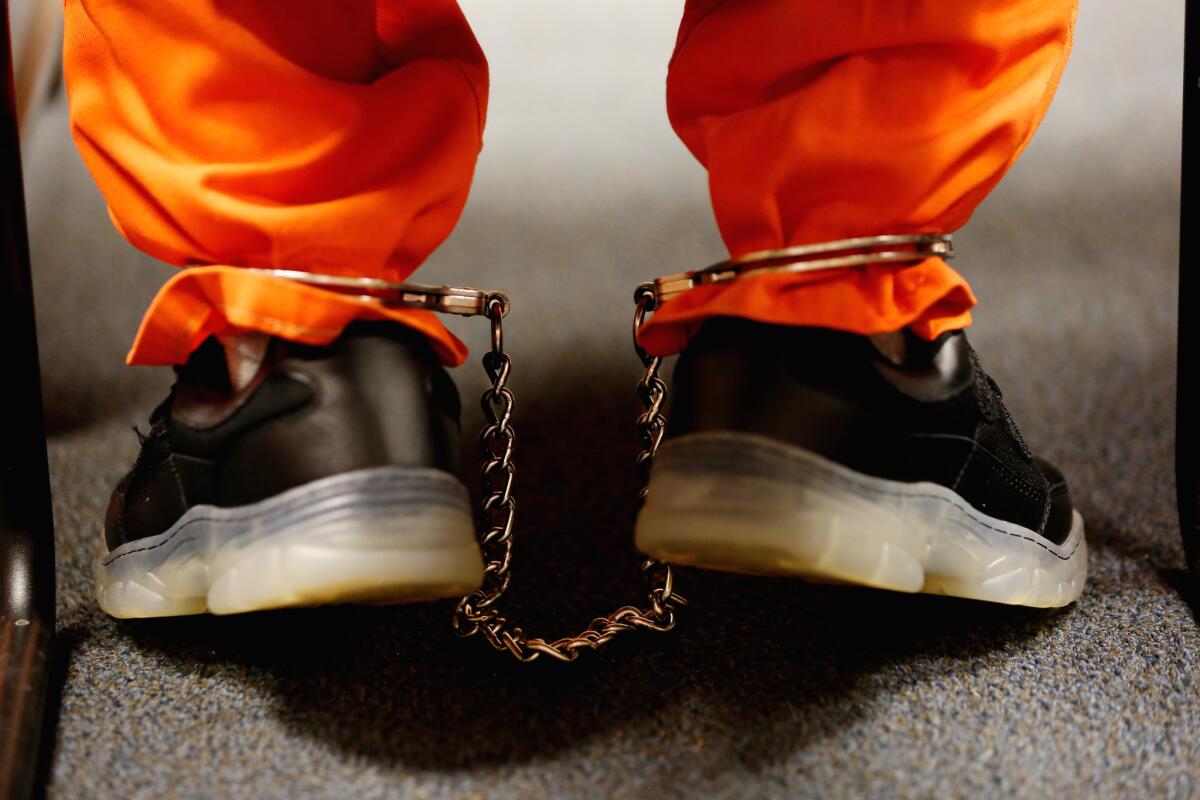
Gov. Jerry Brown on Monday signed more than half a dozen bills that decriminalize prostitution and increase protections for young trafficking victims in court amid growing efforts in California to help children and young adults swept into the trade of forced sex and labor.
Among the bills passed were laws that would prohibit the disclosure of victims’ personal information, provide victims’ services to trafficking witnesses and allow minors under age 16 to testify through closed-circuit televisions in certain cases.
But also approved were hotly contested bills that would decriminalize prostitution and allow human trafficking victims to vacate prior convictions and seal their records.
Senate Bill 1322, authored by Sen. Holly Mitchell (D-Los Angeles), make the crimes of solicitation and loitering with intent to commit prostitution misdemeanors inapplicable to children younger than 18. It also allows law enforcement to take sexually exploited children into temporary custody -- only if leaving them unattended would pose an immediate threat to their health or safety.
Still pending is Senate Bill 1129, authored by Bill Monning (D-Carmel), which would repeal mandatory minimum sentences for specified prostitution offenses.
Legislation to curb human trafficking was a prominent issue at the state Capitol this session, as prosecutors and advocates in recent years have pushed the issue to the political forefront. Most of the proposals have focused on the trade of forced sex and reflect a cultural shift in the approach to prostitution that aims to divert victims forced into the industry away from the criminal justice system.
Brown in 2014 signed legislation placing sex trafficking victims without legal guardians under the authority of the dependency system, which centers on caring for abused and neglected children. And SB 1322 and SB 1129 drew the support of a large coalition of advocates who said the legislation was the next step in proving a better path to social services for children and teens forced into prostitution.
But opponents argued the state lacks the network of social services to protect them. Vulnerable minors, they said, often don’t see themselves as victims, run away from unsecured shelters and remain tied to their traffickers through complicated psychological and emotional bonds.
Read MoreThis card has been updated to correct that a decision on SB 1129 was pending as of Monday. It was signed into law Tuesday.
- Share via
Heads up, Californians: Oct. 24 is your deadline to register to vote
Before California’s primary, more than 17.9 million Californians were registered to vote. It was the largest number of voters ever headed into a primary, but despite high hopes, just more than 8.5 million voted. Not exactly record-breaking.
If you want to make your voice heard in this election, you’ve got until Oct. 24 to register to vote in the Golden State. Here’s how:
To check the status of your voter registration, go here.
Not sure which county you live in? Enter your ZIP at the U.S. Census website.
If you need to register or re-register, visit this site.
California typically goes blue for presidential elections. But 2016 is anything but predictable. A Los Angeles Times/USC Dornsife poll has shown that in California, support for Democratic candidate Hillary Clinton and Republican candidate Donald Trump is nearly neck-in-neck.
California’s election is historic in itself. There will be 17 ballot measures – the most in over 15 years. And for the first time since the state began electing senators, two Democrats will compete for an outgoing senator’s seat.
Need a recap? Read all about it on our politics page.
- Share via
State watchdog agency to investigate funding of campaign against marijuana legalization measure

The state campaign watchdog agency will investigate allegations that a Washington, D.C., group failed to properly disclose how it is funding a campaign against Proposition 64, which would legalize recreational use of marijuana in California, according to a letter released Monday.
The Fair Political Practices Commission sent the letter to attorneys for the pro-ballot measure campaign who had filed a complaint that the group SAM (Smart Approaches to Marijuana) Action Inc. was late in disclosing contributions it received and failed to account for spending at least $149,850.
“Failure to act could result in voters being denied critical information in advance of the election,” the Proposition 64 campaign said in its complaint.
Galena West, chief of the FPPC’s enforcement division, wrote that it “will investigate the allegation(s) under the jurisdiction of the commission” and noted that her office has not made any determination on the validity of the allegations.
The national coalition fighting the marijuana initiative includes former Rep. Patrick Kennedy and has said it is raising more than $2 million to fight initiatives in five states this year, including the November ballot measure in California. A spokesman was not immediately available for comment.
- Share via
California Politics Podcast: Polls on propositions, new accusations in Silicon Valley congressional race
The last few days have seen the release of an enormous amount of polling data on some of the most high-profile state propositions this election season. And in many cases, the early reviews from voters are good.
On this week’s podcast episode, we take a closer look at the polling data and the race still to come on proposals to legalize marijuana, raise taxes and more.
We also discuss how a prominent interest group has pulled its endorsement of Democratic legislators. And finally, we look at new accusations in a Democrat versus Democrat congressional race in Silicon Valley.
I’m joined by Marisa Lagos of KQED News. You can subscribe to the free podcast on iTunes, Soundcloud and a number of other other podcast apps.
- Share via
Rep. Loretta Sanchez goes on attack in U.S. Senate race
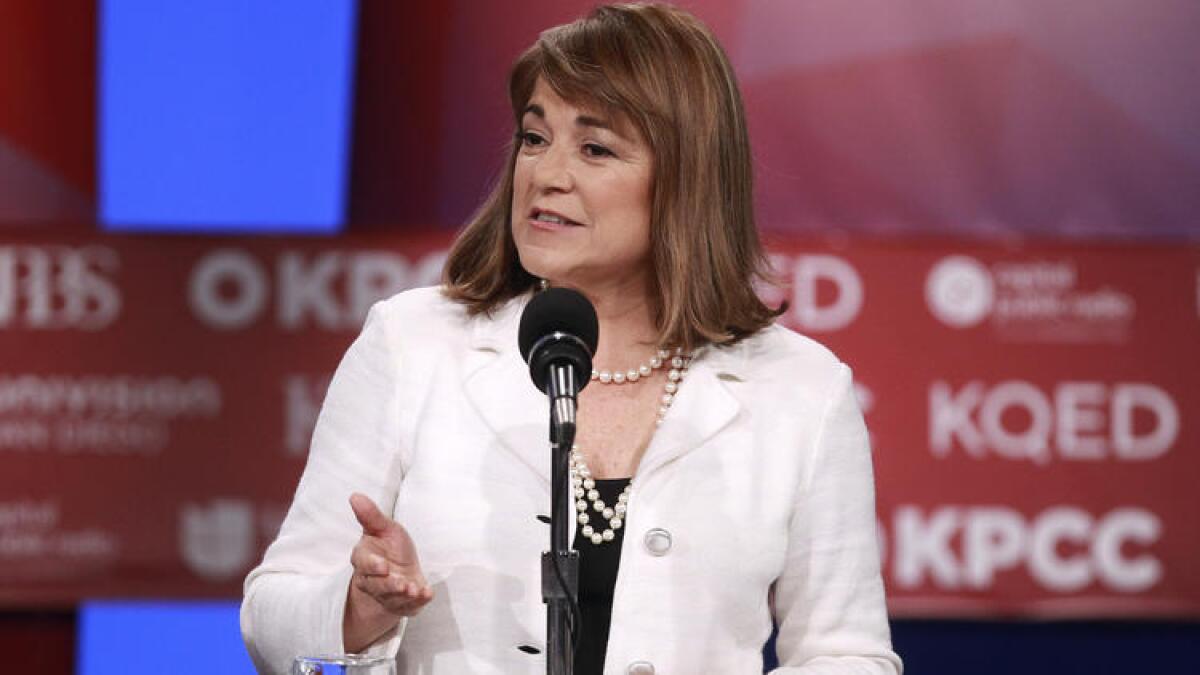
With election day fast approaching, U.S. Rep. Loretta Sanchez (D-Orange) has launched a series of aggressive attacks against state Atty. Gen. Kamala Harris, her rival in California’s U.S. Senate race.
It’s unclear if that tactic has helped Sanchez close the gap on fellow Democrat Harris, who continues to lead in the polls.
The attacks have been centered on the job Harris has done as attorney general, and one citing campaign contributions Harris received from Republican presidential nominee Donald Trump.
While the criticism may peel away some from support for Harris, it could also trigger a backlash against Sanchez, said UC San Diego political scientist Thad Kousser.
- Share via
Donald Trump takes center stage in a Santa Clarita Assembly race attack ad
The race for an open Assembly seat representing Simi Valley and Santa Clarita is getting punchier as Democrat Christy Smith is lobbing new attacks at Republican Dante Acosta’s business.
Those attacks are now part of Smith’s first ad of the general election, which seeks to link Acosta, a Santa Clarita councilman and financial services professional, to Republican presidential nominee Donald Trump.
The ad cites three customer complaints made against Acosta and filed with the Financial Industry Regulatory Authority. Two investigations were denied, but a third complaint alleging negligence ended with a settlement of $35,000, according to records.
Acosta downplayed the issue in an interview with the Santa Clarita Signal newspaper last week.
The ad also tries to paint as Acosta as an extremist, citing an August debate during which he said he had once spoken at a meeting of the anti-government group the Oath Keepers.
“Dante Acosta and Donald Trump are like two peas in a pod,” said Smith’s political consultant, Dave Jacobson. He said the ad would run districtwide on television as well as online.
Smith and Acosta are running to replace Assemblyman Scott Wilk, who is running for state Senate.
- Share via
California outlaws possession of synthetic drug ‘spice’ amid overdoses on L.A.’s Skid Row
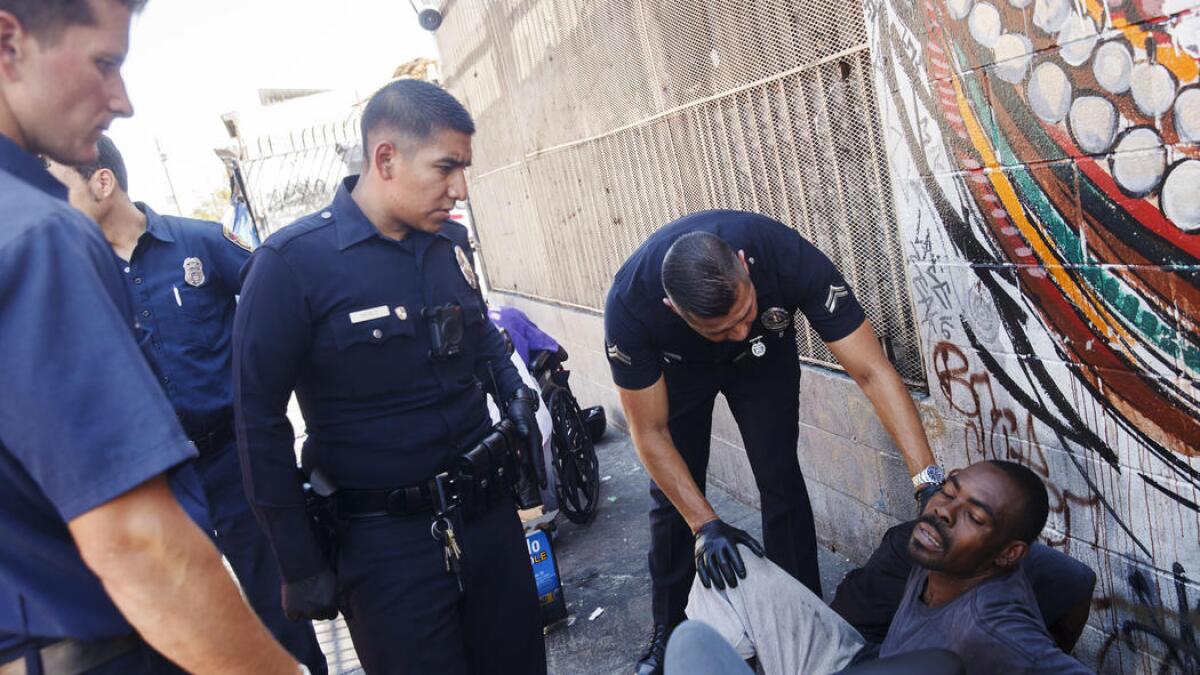
Gov. Jerry Brown on Sunday signed legislation that outlaws the possession of the synthetic drug “spice” after law enforcement officials and paramedics tended to dozens of overdoses on Skid Row in Los Angeles.
Senate Bill 139, introduced by Sen. Cathleen Galgiani (D-Stockton) and sponsored by the California Police Chiefs Assn., adds a number of specified drugs and chemicals to the existing list of prohibited synthetic cannabinoids.
It is already a crime to sell those drugs. But the urgency measure, which was requested by the California Narcotics Officers Assn., would make a first offense of possession of specified synthetic cannabinoids or stimulants an infraction. A second or third offense could be a misdemeanor.
This law “is very important because young people believe that if a drug is not illegal, it is okay and that it is safe,” Galgiani said. “But underground chemists manufacture these drugs in warehouses and then market them to kids as being legal when in fact they are more dangerous.”
For law enforcement, the rise of synthetic drugs has been difficult to regulate, as sellers change their chemical combinations often.
U.S. drug companies first developed synthetic cannabinoids in the 1980s as they sought to find drugs to treat serious diseases, such as cancer and lupus. Although their researchers failed, illegal drug manufacturers then took the formula and marketed it across Europe as herbal incense before spice arrived in new forms in the U.S. in 2009.
Galgiani’s bill drew the strong support of law enforcement associations in Los Angeles, where officials have been scrambling to warn people about the drug, which can produce effects similar to those of marijuana but is a different plant material sprayed with a psychoactive chemical.
The California Police Chiefs Association said the legislation, which provides treatment and education options for anyone caught in possession of a synthetic drug or stimulant, would encourage defendants to take advantage of those programs.
“Getting people into treatment is literally lifesaving,” the association has said in a statement. “Without treatment intervention, persons using these drugs face a continued downward cycle.”
The measure was opposed by the American Civil Liberties Union and the Drug Policy Alliance.
Jolene Forman, a staff attorney with the Drug Policy Alliance, said similar laws across the country have failed to decrease the low rates of synthetic cannabinoid use, while they exacerbated “the health risks by pushing the risky behavior underground.”
“The drug war has been proven to be ineffective at resolving our nation’s drug problems,” Forman said. “Instead, it has wasted billions of public dollars and erected lifetime barriers to successful employment and education. Rather than learning from these failures, SB 139 maintains the status quo.”
- Share via
Expansion of state’s help in paying the emergency costs of San Bernardino terror attack rejected by Gov. Jerry Brown
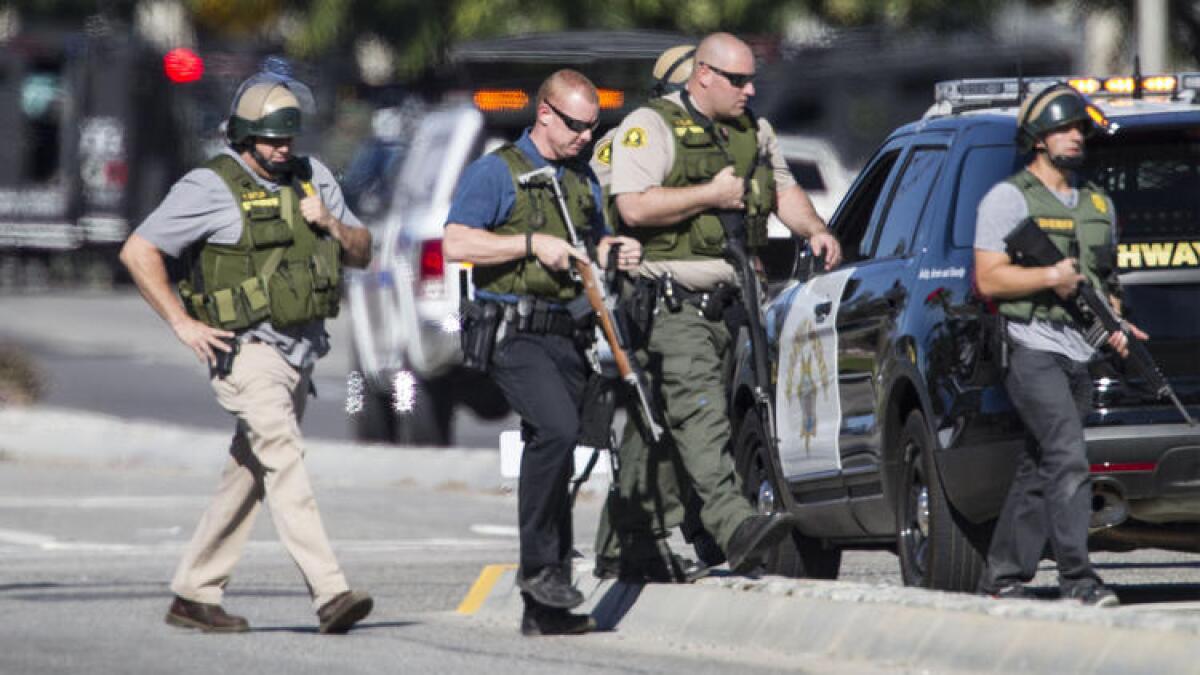
An effort to further defray local emergency costs connected to the San Bernardino mass shooting in 2015 was blocked by Gov. Jerry Brown on Sunday, with the governor citing the “precedent” the special help would create.
Senate Bill 1385 would have allowed local law enforcement agencies to have more of their costs reimbursed from the deadly Dec. 2, 2015, shooting. Fourteen people were killed in the attack at the Inland Regional Center in San Bernardino, with 22 others seriously injured.
Law enforcement officers said the killers, Syed Rizwan Farook, 28, and his wife, Tashfeen Malik, 29, had been inspired by Islamic terrorists but had no direct ties to them.
The cost of responding to the attack topped $18 million for local agencies. SB 1385 sought to boost the level of reimbursement the state would have provided from 75% of eligible costs to 100% of those costs.
Brown, however, rejected the plan for the chance it would serve as a template for future incidents.
“I recognize the unique circumstances involved in this horrific terrorist attack,” wrote the governor in his veto message. “However, this bill sets the expectation that the state will assume all financial responsibility for future emergency costs.”
- Share via
No vouchers for families on welfare to buy diapers after Gov. Jerry Brown vetoes plan
Gov. Jerry Brown vetoed an effort Sunday to subsidize diapers needed by families receiving government assistance, calling the plan and several other efforts “an end run” around the annual budget process.
The veto on Assembly Bill 492 came almost two weeks after the governor vetoed a different bill aimed at reducing the cost of diapers, both efforts by Assemblywoman Lorena Gonzalez (D-San Diego) to help low-income families.
“The budget process allows all spending proposals to be weighed equally through public hearings, negotiations and, finally, approval of a balanced budget,” Brown wrote. “This process is even more important when the state’s budget is precariously balanced.”
Gonzalez tweeted her reaction on Sunday, saying she’ll continue efforts next year.
Brown vetoed five bills on Sunday that he said would add costs to the state budget, including an effort to restore cost-of-living increases to a supplemental program for the elderly, blind and disabled.
In all, the governor’s veto message estimated a cost of $240 million if the bills had been enacted.
- Share via
Coastal Commission to gain environmental justice member to represent low-income communities

Gov. Jerry Brown on Saturday signed legislation aimed at providing a greater voice on the California Coastal Commission to racially diverse, low-income communities.
Brown signed a bill by Assemblywoman Autumn R. Burke (D-Inglewood) that requires one of the members appointed to the Coastal Commission by the governor to work directly with low-income communities in the state that are most burdened by high levels of pollution and other concerns.
AB 2616 also allows the panel to consider environmental justice issues when making important decisions.
“Every Californian deserves access to our coast,” Burke said recently, adding her bill can “truly make a difference in communities that have been heavily polluted and repeatedly marginalized.”
- Share via
Californians can now act to save dogs from hot cars

Gov. Jerry Brown on Saturday signed into law a measure allowing Californians to break into vehicles to rescue animals if they appear to be in danger from excessive heat.
The bill by Assemblyman Marc Steinorth (R-Rancho Cucamonga), Miguel Santiago (D-Los Angeles) and others was introduced after a series of incidents in which dogs died after being left in closed cars on hot days.
“We’re very excited about the lives this new law will save,” Steinorth said in a statement Saturday on Facebook. “Thank you to everyone who helped us raise awareness of this serious issue and showed their support.”
Under AB 797, a citizen must first call law enforcement to report a situation in which he or she believes an animal to be in peril.
But if the animal is in imminent danger, the car is locked, and law enforcement is not arriving quickly enough to save the animal’s life, the bill provides immunity from civil and criminal liability to a person causing vehicle damage for the purpose of rescuing the animal. The measure was supported by the Humane Society of the United States and the Los Angeles district attorney’s office.
- Share via
Allegations that oil money was funneled to Gov. Jerry Brown’s campaign will be investigated by state watchdog
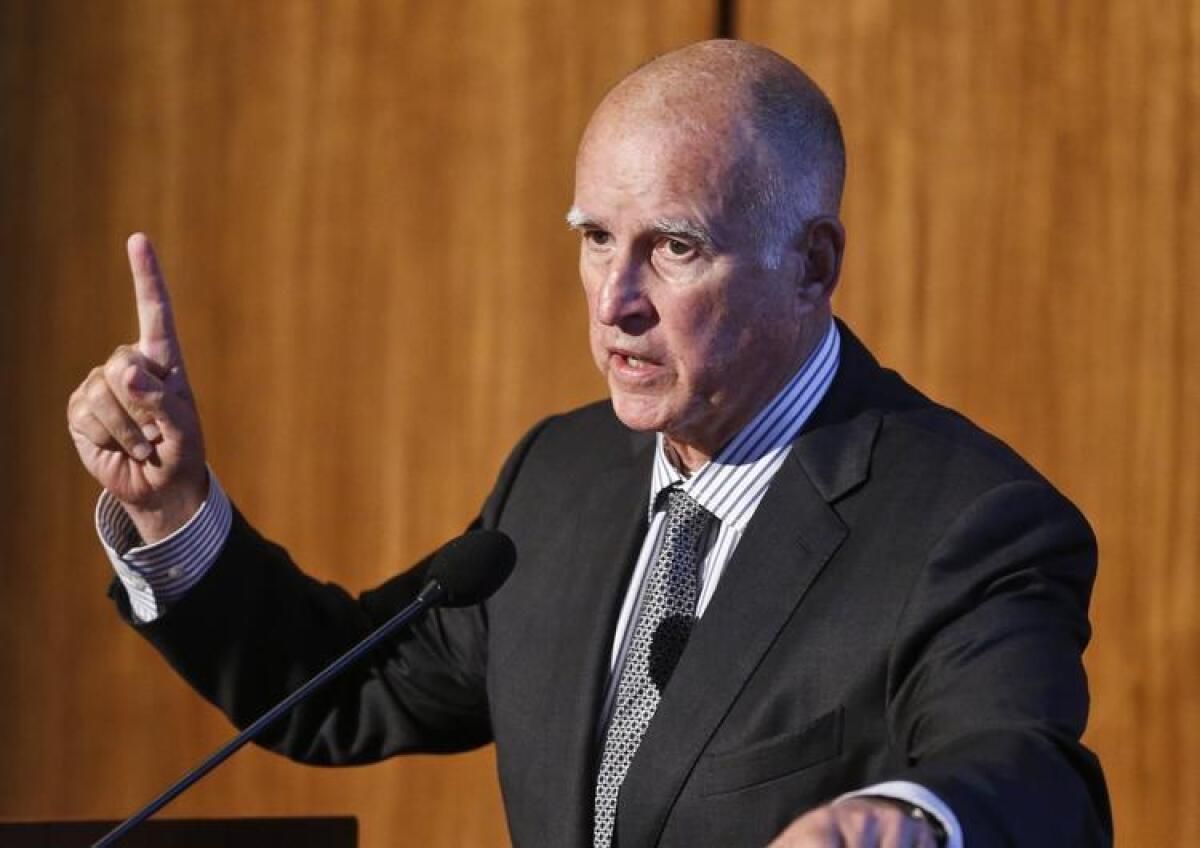
The state’s campaign finance watchdog agency will investigate allegations that the California Democratic Party improperly funneled contributions from the oil and energy industry to the 2014 reelection campaign of Gov. Jerry Brown, officials said Friday.
The group Consumer Watchdog filed a complaint with the state Fair Political Practices Commission alleging that hundreds of thousands of dollars were given by energy companies to the state party, which shortly afterward made large donations to Brown’s campaign.
“It was a laundry machine for dirty energy contributions to the Brown administration, a slush fund of sorts, hiding big oil, utility and other dirty energy dollars in close proximity to officials’ actions,” said Jamie Court, president of the group Brown’s Dirty Hands, which made the allegations in a report.
In one example given in the complaint, the state party gave Brown’s campaign $300,000 a week after Chevron contributed $350,000 to the party.
In a letter Friday, Galena West, chief of enforcement for the Fair Political Practices Commission, said she would not be investigating other people named in the complaint.
“This letter is to notify you that the enforcement division of the Fair Political Practices Commission will investigate the California Democratic Party for alleged violation of the Political Reform Act’s campaign reporting provisions resulting from information contained in your sworn complaint,” West wrote.
West also wrote that her office has not made any determination about the validity of the allegations.
Democratic Party spokesman Michael Soller said the group has received the letter and has “been cooperating fully with their inquiry.” The governor’s office declined to comment immediately.
- Share via
California congressman heads back to Colombia for peace accord signing
Rep. Sam Farr (D-Carmel) will travel to Colombia on Sunday night with U.S. Secretary of State John F. Kerry to be present at the signing of a peace agreement between the country’s government and the Revolutionary Armed Forces of Colombia, better known as FARC.
“This is an incredible, historic moment for peace,” Farr said in a statement. “The transition after decades of violence won’t be easy, but Colombians are ready for a new era of peace and prosperity.”
Farr was a Peace Corps volunteer in Medellin, Colombia, from 1964 to 1966. He credits the experience with getting him involved in public service and for his work on Colombia.
- Share via
California Gov. Jerry Brown signs bill to encourage reversible lane use

California drivers could start seeing more reversible lanes now that Gov. Jerry Brown has signed a bill officially encouraging their use.
Reversible lanes can be switched to allow traffic in either direction and are used to accommodate more traffic in one direction during peak hours.
Such lanes have been used in San Diego on the San Diego-Coronado Bridge and Interstate 15 and in the Bay Area on the Golden Gate Bridge and the Caldecott Tunnel.
The lanes can be an efficient way to decrease traffic congestion, according to the bill’s author, Assemblyman Mike Gatto (D-Glendale).
Starting next year, the new law will require California transportation agencies to consider incorporating reversible lanes before starting some major road and highway projects.
- Share via
Gov. Brown kicks smokers out of bleachers at youth sports events
Continuing the state’s campaign against tobacco use, Gov. Jerry Brown on Friday banned smoking and the use of electronic cigarettes within 250 feet of any Little League baseball game or other youth sports event.
Brown signed the bill by Sen. Richard Pan (D-Sacramento), a pediatrician, who said tobacco products have no place near children.
“Youth sports is about developing good and healthy habits and smoking is the exact opposite of that,” Pan said.
The bill is one of several anti-smoking bills either approved already or still under consideration by the governor.
Pan introduced the measure, SB 977, at the request of the eighth grade class at St. Elizabeth Ann Seton Elementary School in Elk Grove.
Pan said that children exposed to secondhand smoke are at increased risk of asthma, lung infection and ear disease, among other health conditions.
- Share via
He’s into meditation: The things we learn about California Lt. Gov. Gavin Newsom in a new magazine interview
An interview in the October edition of San Francisco magazine offers a few interesting new insights into California Lt. Gov. Gavin Newsom — both political and personal.
- He has praise for Gov. Jerry Brown’s political acumen. “I’m mesmerized by him,” said Newsom. But the lieutenant governor, while also praising his fellow Democrat for proving “that you can be progressive without being profligate,” he also wishes there was “a little bit more idealism.”
- His in-laws are staunch Republicans and Newsom hints at the conversations they have had about GOP presidential nominee Donald Trump. “I’m enjoying every aspect of it,” Newsom said. “I’m like, this is your guy, this is your party. He is your Frankenstein.”
- He was turned on to meditation by Marc Benioff, the CEO of the software company Salesforce. “I thought maybe it was essential,” he said. “And for the last two, two and a half years, I’ve been very devoted to it. And it’s been profound for me.”
- Share via
California women can soon pick up a year’s worth of birth control at once
Women living in the Golden State soon will be able to pick up an entire year’s worth of birth control pills at one time under a bill the governor signed Friday.
The new law will allow pharmacists to dispense a 12-month supply of hormonal birth control pills. It also will require healthcare plans to cover the year-at-a-time prescription. The law goes into effect Jan. 1.
State law previously barred pharmacists from dispensing more than three months’ supply at once.
Supporters of the new law say letting women pick up more pills will help prevent unintended pregnancy, especially for women in rural areas who do not have a pharmacy nearby.
- Share via
Why can’t politicians solve the state’s housing affordability crisis?
This year, a major proposal from Gov. Jerry Brown to deal with California’s spiraling housing affordability problem went down in flames.
We hosted a lively Twitter chat Friday morning to explain why Brown’s measure failed and why it’s so hard to find a political solution to the state’s housing problems. You can check out my Twitter feed @dillonliam or the #housingchat hashtag for the full discussion. Here are some of the best parts:
- Share via
Police chiefs group decides to oppose California’s gun control ballot proposition

The California Police Chiefs Assn. has decided to oppose Proposition 63, arguing the gun control measure that will be on California’s ballot “fails to meet the appropriate balance between public safety and individual gun rights.”
Ventura Police Chief Ken Corney, who is president of the association, wrote that his group supported legislation enacted this year that requires background checks for those buying ammunition. But Corney said Proposition 63 reverses some exemptions that allow law enforcement to continue purchasing ammunition freely for on-duty purposes. He also objected on the grounds that the initiative, which was spearheaded by Lt. Gov. Gavin Newsom, creates “a duplicative database” that will be an expensive and less effective way to monitor ammunition purchases.
“Essentially, Proposition 63 complicates current law with one that is costlier and seriously flawed,” Corney wrote.
The chiefs group also supported legislation enacted this year that penalizes false reporting of a gun theft, but said the initiative makes failure to report a theft a crime.
“Penalizing the failure to report lost and stolen firearms actually can deter individuals to report for fear of penalty, which has already been proven to be the case in many areas where local governments have enacted similar ordinances,” the chief wrote.
Dan Newman, a spokesman for the campaign in favor of the initiative, pointed to polls showing the measure has significant support.
“Most Californians - including many in law enforcement - support Prop 63 in order to keep guns and ammo from dangerous people,” Newman said.
A USC Dornsife/Los Angeles Times poll found the initiative has strong support among Californians.
- Share via
Could tougher punishment for sex crimes hurt minority communities in California?
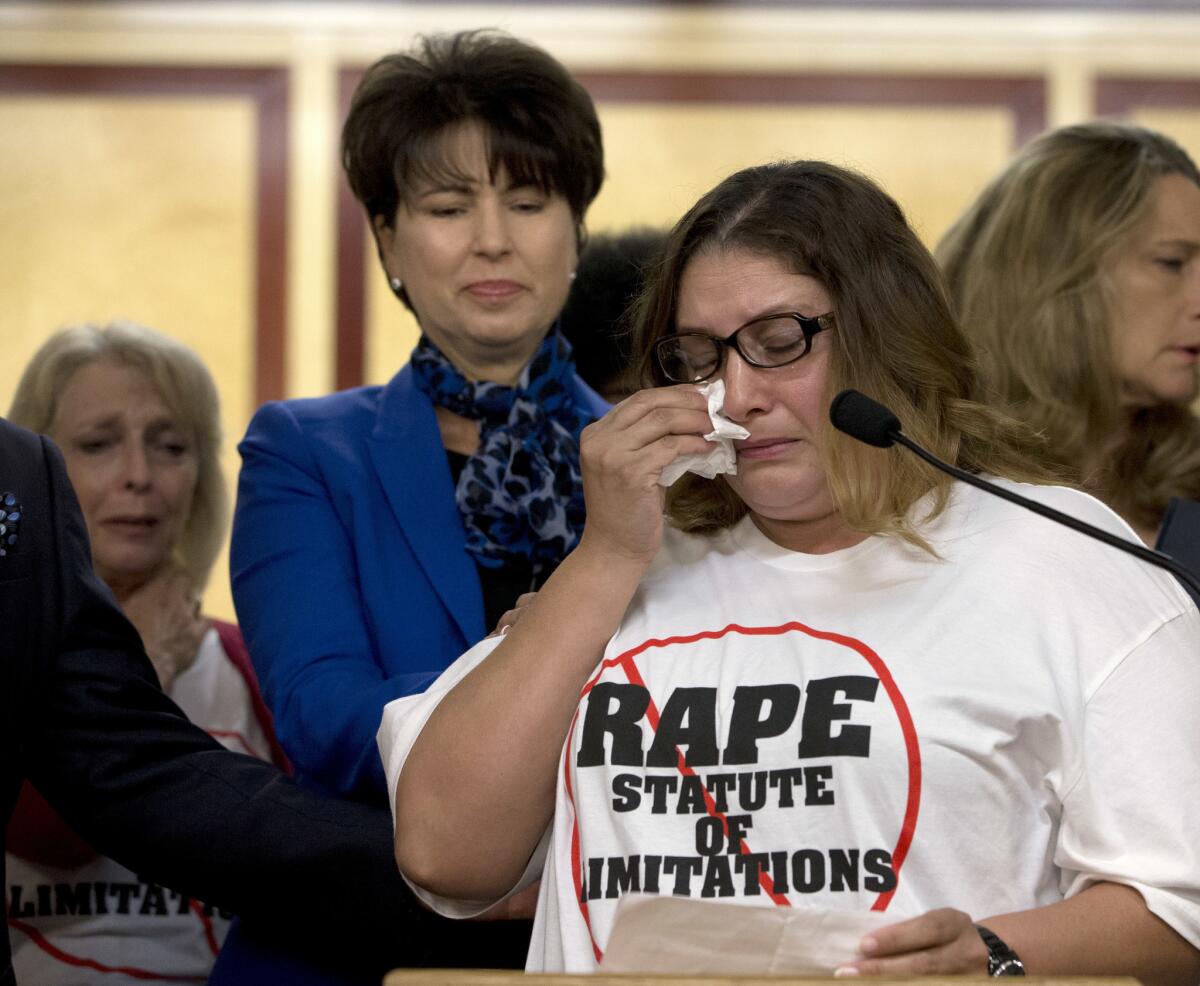
High-profile cases have spurred several bills now before Gov. Jerry Brown that would increase repercussions for defendants in sex crimes. Supporters of the bills have said California needs to remain tough on sex offenders and railed against a justice system they said blames victims for sexual assault, fails to keep women safe and is biased toward the LGBT community.
But a growing number of lawyers and advocates worry the tough-on-crime strategies will unfairly affect communities of color in California.
Opponents of the legislation say they are not against holding sex offenders accountable. They are against proposals that continue to stack the deck against poor and minority defendants in a criminal justice system where laws are often unequally applied.
- Share via
Progressive group will back Nanette Barragán in the all-Democrat race to represent L.A.’s port communities in Congress

The Progressive Change Campaign Committee is endorsing Democrat Nanette Barragán to represent L.A.’s port communities, comparing her to a leader of her party’s progressive wing, U.S. Sen. Elizabeth Warren (D-Mass.).
“Nanette Barragán will be a Warren-wing warrior in Congress,” the committee’s co-founder, Stephanie Taylor, said in a statement.
The race to represent California’s 44th Congressional District pits attorney Barragán against fellow Democrat and state Sen. Isadore Hall for one of the few open congressional seats in the state. It’s been a nasty fight from the beginning.
The committee works to elect progressive candidates and the endorsement comes with fundraising assistance, and with volunteer and staff support.
- Share via
Khanna campaign manager to step down following Honda’s lawsuit
Ro Khanna’s campaign manager, Brian Parvizshahi, will step down effective immediately following a lawsuit claiming Parvizshahi illegally accessed confidential donor data belonging to Rep. Mike Honda’s campaign.
The lawsuit alleges Parvizshahi gained access to the files as an intern for Honda’s former fundraising consultant, and claims he continued to access donor lists and other campaign data after he joined the Khanna campaign.
In a statement four hours after the Honda campaign news conference, Khanna campaign spokesman Hari Sevugan said Parvizshahi had requested to step down as campaign manager. Sevugan also took a dig at Khanna’s rival.
“By filing this lawsuit with six weeks to go and down in the polls, he believes Mike Honda is trying to distract voters from the ongoing ethics investigation into how he sold special governmental access to his VIP donors after accepting $3 million in PAC contributions,” the statement read. “And Brian will not let Mike Honda use him to distract voters from the need for real change.”
No interim campaign manager has been chosen, Sevugan said.
- Share via
More park space could be coming to the lower L.A. River thanks to bill signed by Gov. Brown

Addressing a shortage of parks in the area, Gov. Jerry Brown on Thursday signed legislation creating a Lower Los Angeles River Recreation and Parks District to launch the construction, improvement and maintenance of new amenities.
A report by Los Angeles County recently identified the area around the lower river as one of the most park-poor areas in the county. The cities of Maywood and Bell have 0.3 and 0.4 acres of park per 1,000 residents respectively, while the county-wide average is 3.3 acres per 1,000 residents.
Sen. Ricardo Lara (D-Bell Gardens) said a lack of funding had hindered efforts to provide more parks, and the new district would be able to apply for millions of dollars that had recently been approved in bond measures and legislation.
“The goal of this bill is to increase access to outdoor space and parks in a region where those amenities are sorely lacking,” Lara said in a statement. “This bill will help to promote the development of open space and parks for the benefit of Southeast communities and ensure that the Lower L.A. River is no longer overlooked.”
- Share via
Watch: Mike Honda’s campaign holds news conference on lawsuit against rival Ro Khanna